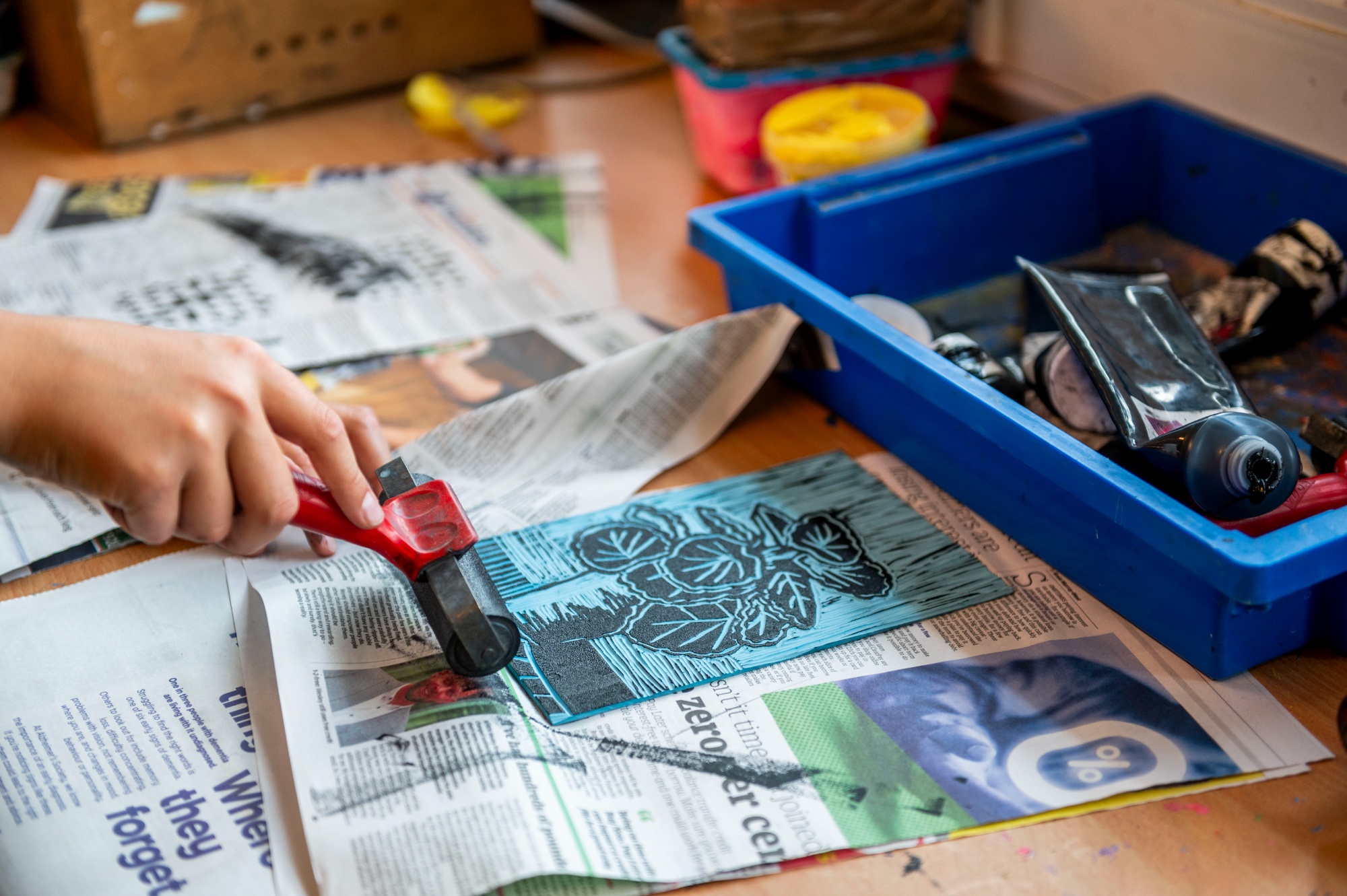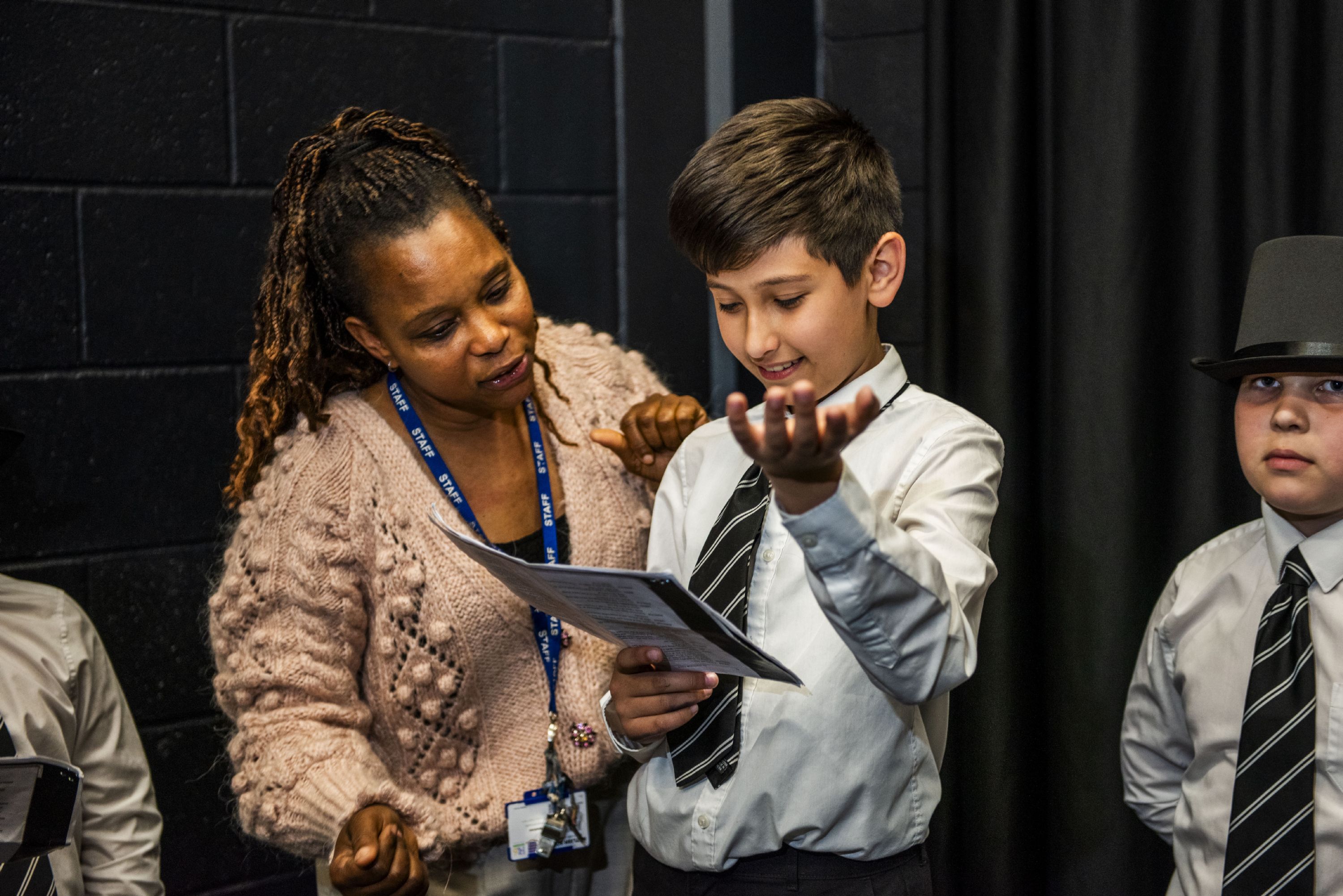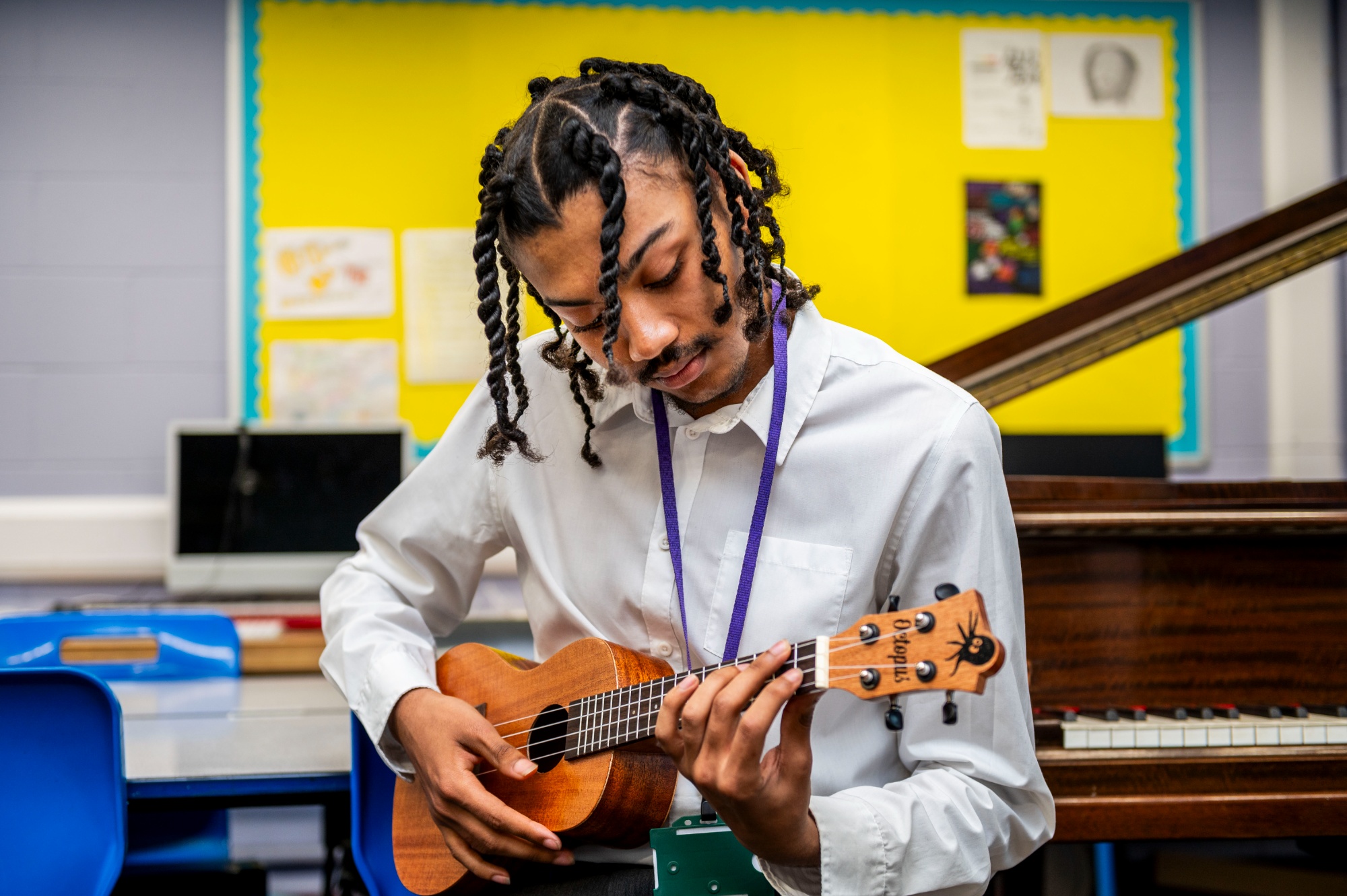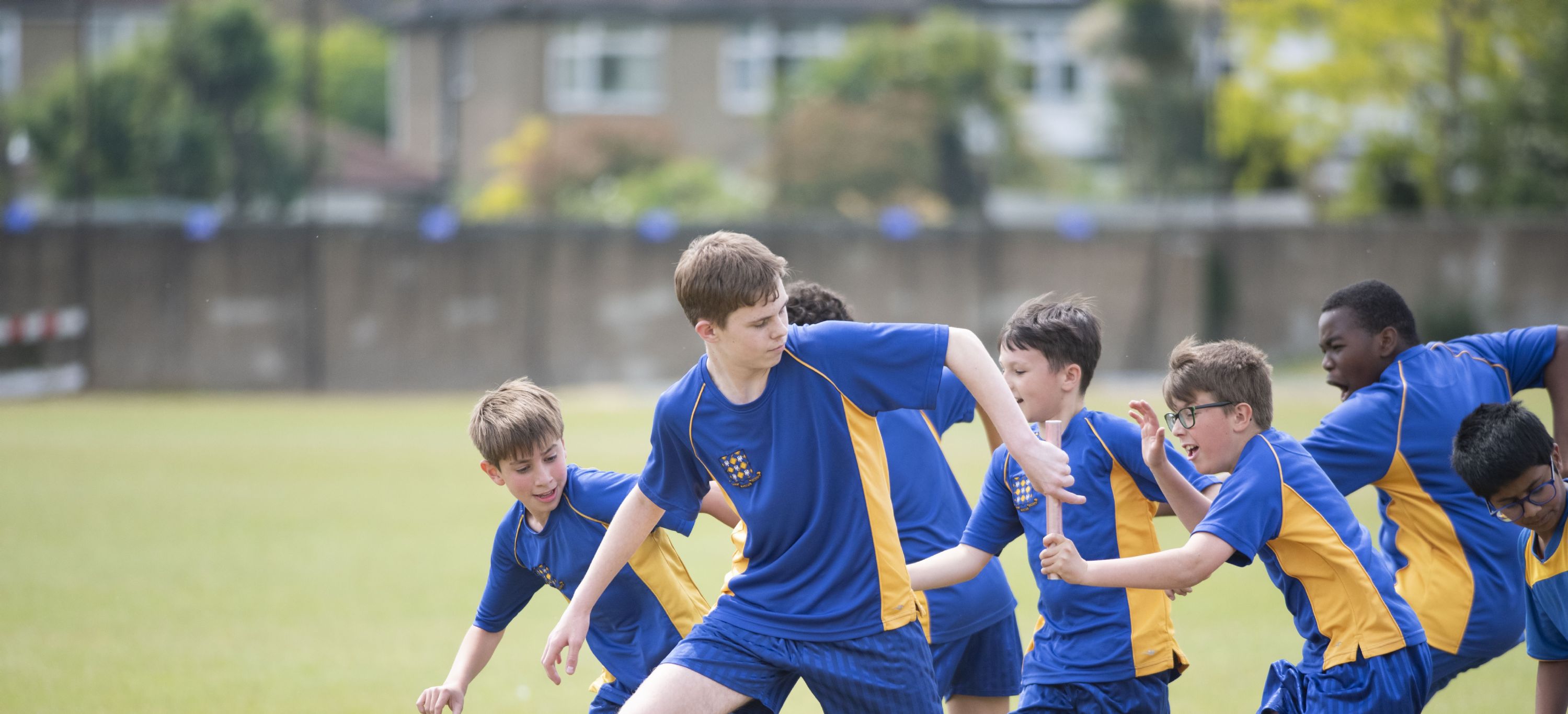Subject Information
Subject information for Key Stage 3 and Key Stage 4, Years 7 to 11, is found on this page.
Information on the Key Stage 5, sixth form, curriculum can be found on our RR6 Curriculum page. For further information on the individual subjects offered in RR6 please visit our Open Event and on-line prospectus found on the RR6 Admissions page.
Art
Head of Department: Mr Adegbenle
Please click here to view our Curriculum Map:
To find out more about our Art Department, please watch our video.
The Art department’s main philosophies are to develop 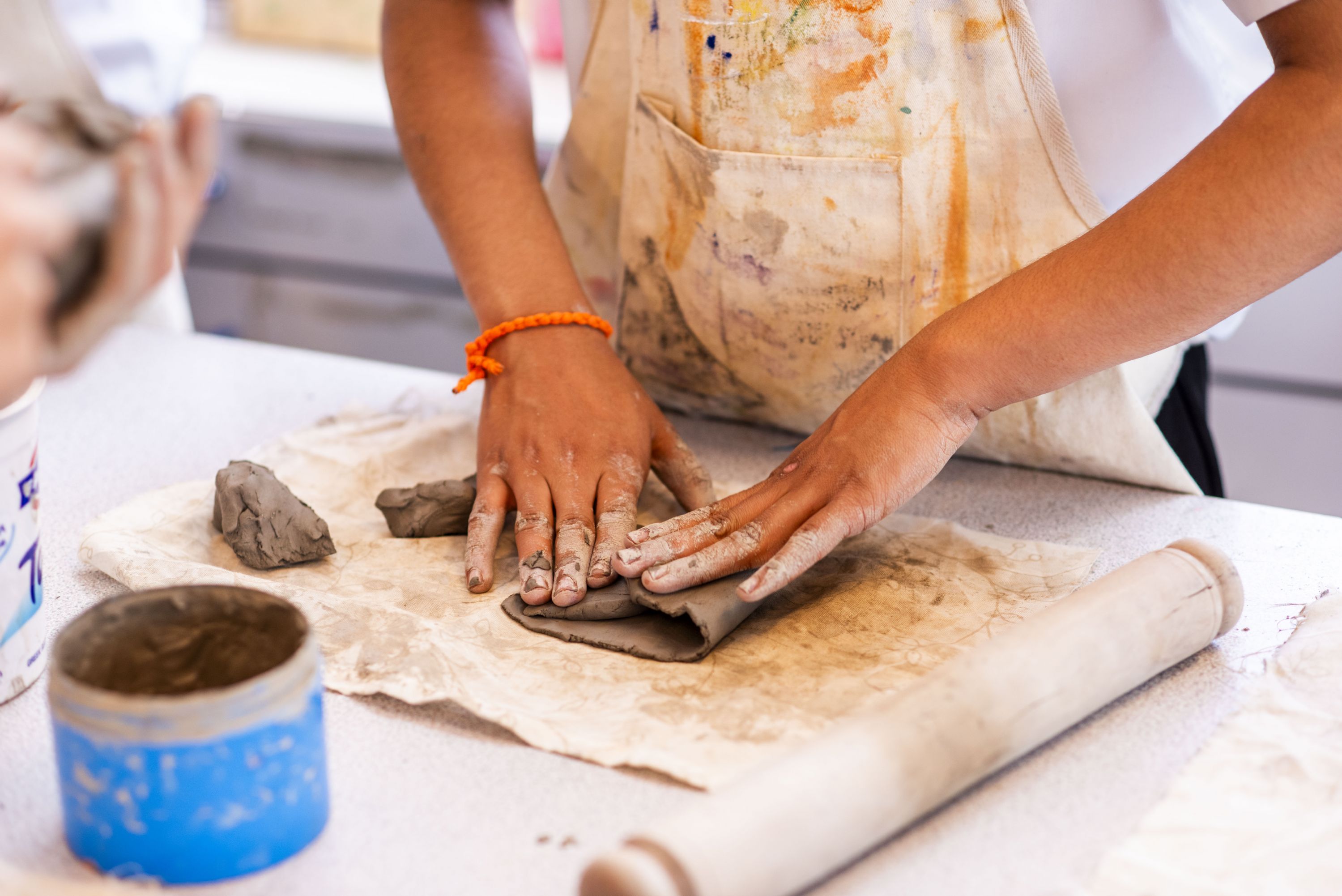 visual skills through direct observation. We offer differentiated work and options for outcomes to guarantee success for all. Students at Rutlish explore the media of drawing, print, sculpture and mix-media. They research a variety of artists’ work and use this to inspire their own ideas and methods of working. The standard of work produced is exceptionally high with a focus on technique, especially drawing together with an informed understanding of others’ art practice.
visual skills through direct observation. We offer differentiated work and options for outcomes to guarantee success for all. Students at Rutlish explore the media of drawing, print, sculpture and mix-media. They research a variety of artists’ work and use this to inspire their own ideas and methods of working. The standard of work produced is exceptionally high with a focus on technique, especially drawing together with an informed understanding of others’ art practice.
We aim to offer a positive, lively and creative environment. Teachers are trained specialists and practitioners who are all fully involved in the planning and delivery of the curriculum for all key stages. Students are provided with sketchbooks and are encouraged to present their work creatively – to record observations, research, experimentation, development of ideas, reviews and evaluations.
Key Stage 3
In Years 7-9 students study a range of topics that constantly introduce new skills and build upon prior knowledge.
Year 7
- Line & Tone
- Natural Environment (Mix media collage)
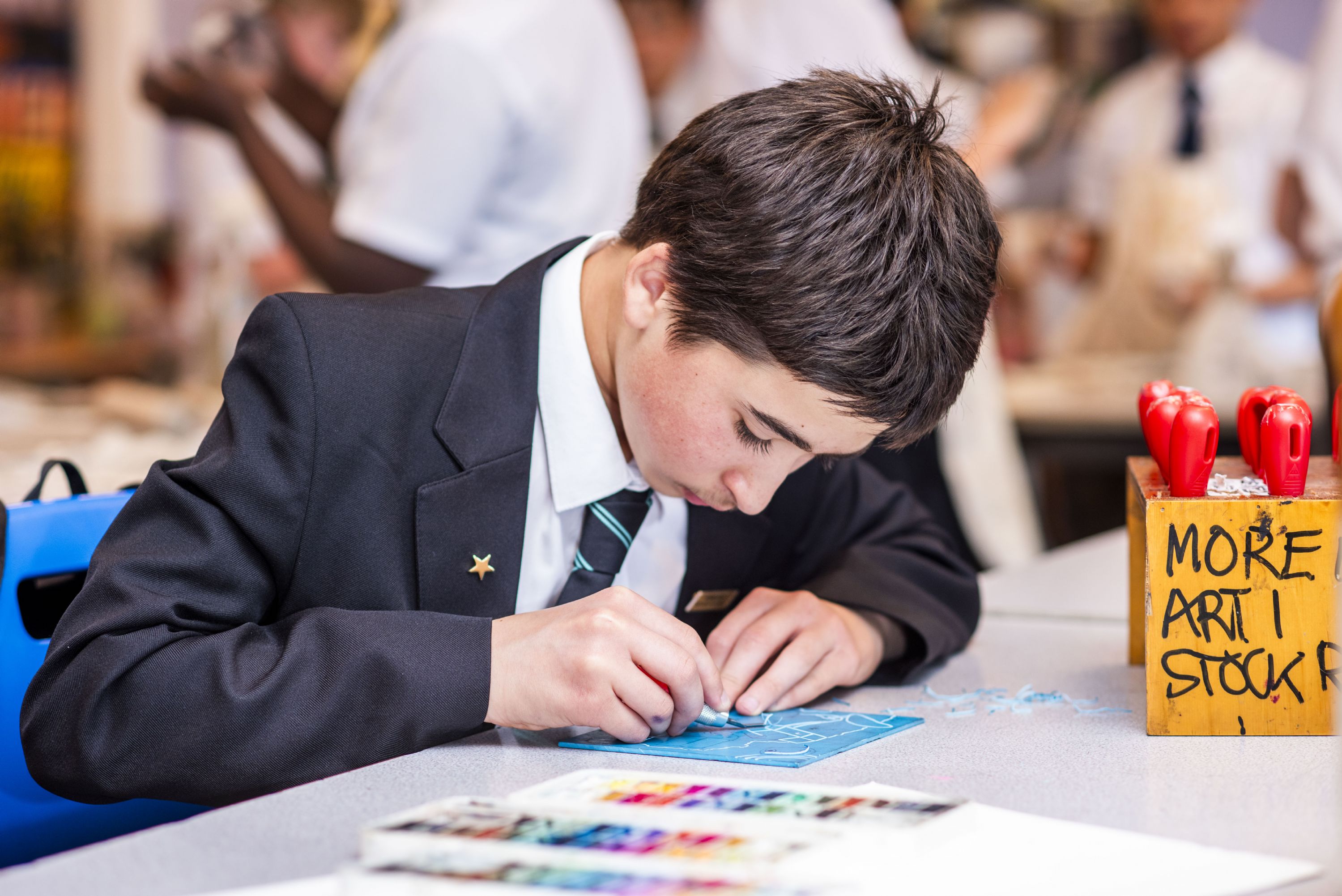
- 3D Sea creature clay relief tile
Year 8
- Narrative (Set Design)
- Narrative (lino outcome)
- Human Senses (2D/Mix media)
Year 9
- Street Art inspired Self Portraits
- Pop Art (3D Food Sculptures)
Key Stage 4 -GCSE Art
A two-year course leading to a GCSE in Art, Craft and Design. This GCSE encourages an adventurous and enquiring approach to art and design. Successful students will be able to demonstrate an understanding of past and contemporary art and design practice and be able to produce a personal response that embraces a range of ideas.
The course consists of one unit of coursework (60%) which includes a number of smaller projects and an externally set assignment (40%).
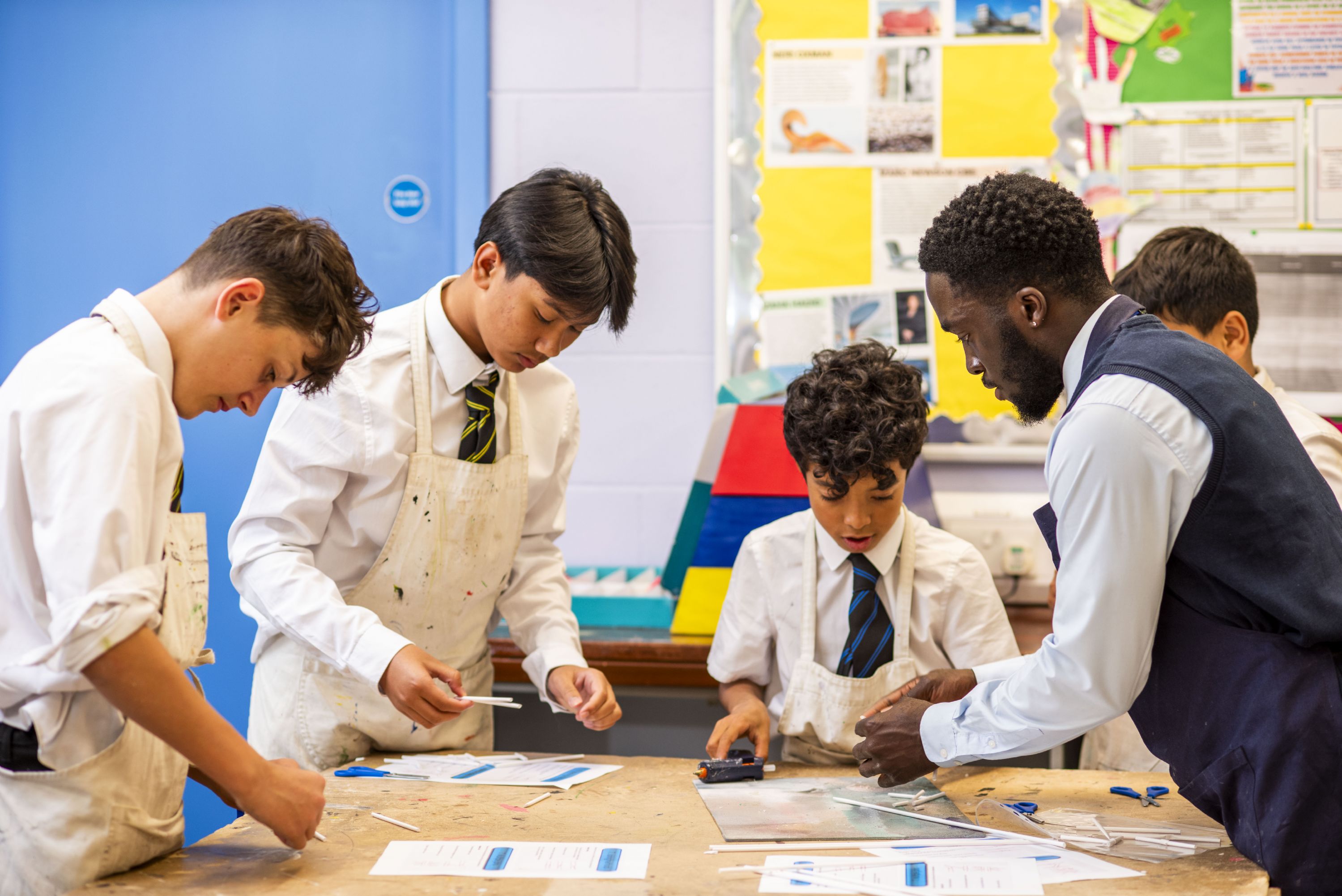
Areas of Study
- My surroundings workshops
- Wrapped 2D/3D/ Mix-media
- Wrapped extended (own focus)
- Exam (externally set themes)
Enrichment and enhancement activities
Enrichment and enhancement activities play a vital role in supporting the teaching and learning process. We are proud of the work of our students and we celebrate their work around the school and in the local community.
Enrichment and enhancement activities have previously included:
- Lunchtime and after school art clubs
- Visits to the Tate Modern and The London Eye
- End of year exhibition of Year 11 GCSE artwork
- UAL Saturday sessions for Year 10 to support college applications
- Art competitions
| What careers will the subject support? | Which courses will the subject support Post 16? |
|---|---|
| There are many careers leading on from an A level or Degree in Art and Design such as architecture, fashion design, graphic design, illustration, interior design, photography, new media design, modelmaking, landscape architecture, jewellery design, printing, engraving, restoration, stage and set design | This course can lead to AS and A Level courses in Art & Design, Creative media, Photography and Textiles. The new BTEC specification in Art and Design uses a combination of assessment styles to give students confidence they can apply their knowledge to succeed in the workplace – and have the study skills to continue learning on higher education courses and throughout their career. |
| Useful GCSE Resources |
|---|
| GCSE Art & Design Bitesize |
| A Guide to the GCSE Art sketchbook |
| Art and Design AQA GCSE |
| Exam Help- Student Resource- Tate |
| Creative Opportunities for students PowerPoint 2023/24 |
Business Studies
Head of Department: Mr Redzepagic
Please click here to view our Curriculum Map:
BUSINESS STUDIES CURRICULUM MAP
Vision
BTEC qualifications at Rutlish are designed to provide specialist work-related qualifications in a range of sectors. They have been developed to provide the knowledge, understanding and functional skills necessary to prepare learners for employment and/or to provide career development opportunities for those already in work.
Key Stage 4
BTEC Tech Award in Enterprise
The BTEC Tech Award suite as a part of vocational learning give learners the opportunity to build skills that show an aptitude for further learning both in the sector and more widely. All businesses need enterprising employees to drive their organisations forward, to have ideas and initiatives to instigate growth, and to ensure that businesses survive in this fast-changing world.
Enterprise is a key government focus and is set to form an important part of the UK’s global economic status, both now and in the future. Enterprise skills provide a fantastic progression pathway into a number of roles in an organisation and are transferable into all businesses.
The BTEC Level 1 and Level 2 Tech Award in Enterprise is a Level 2 qualification, equivalent to 1 GCSE grade A*-C. However, it is graded at Level 2 Pass, Level 2 Merit, Level 2 Distinction, Level 2 Distinction*, Level 1 and Unclassified. The two years course consist of:
- 120 guided-learning-hour qualification (equivalent in teaching time to one GCSE);
- 3 core components
- 40% of the qualification that is externally assessed – Component 3 ‘Promoting and Finance for Enterprise’. Edexcel sets and marks these assessments;
- available on the National Qualifications Framework (NQF);
- the development of core knowledge and understanding, including the range of enterprises and the key features and factors that contribute to an enterprise’s level of success;
- the development and application of skills such as analysing research, information, planning and financial forecasting, communicating and problem solving;
- reflective practice through carrying out a small enterprise activity that allows learners to respond to feedback and identify areas for improvement.
Year 10
Component 1- Exploring Enterprises (36 GLH)
Learning aim A: Examine the characteristics of enterprises
Description
- Learners will investigate two real different SMEs, e.g. a service provider or supplier of goods locally and a larger SME.
- Learners will consider the characteristics of the SMEs and their owners, and the importance of these characteristics in achieving success.
We seek local businesses to participate in our questionnaire.
Component 3 -Promoting and Finance for Enterprise (48 GLH)
Learners will explore the different promotional methods used by enterprises and the factors that influence how enterprises identify and target their market. Learners will explore financial documents and how to use them to monitor and improve the performance of an enterprise in order to make decisions and recommend strategies for success.
Year 11
Component 2 – Planning and Finance for Enterprise (36 GLH)
Learners will individually select an idea for an enterprise to plan and pitch. They will work individually or as a small group to run a micro-enterprise activity and will develop their skills in operating and reviewing the success of the enterprise.
| What careers will the subject support? | Which courses will the subject support Post 16? |
|---|---|
| BTEC Tech Award in Enterprise prepares them to enter employment or apprenticeships, or to move on to higher education by studying a degree in the business sector. | BTEC National Extended Certificate in Business, Applied Science, Creative Digital Media Production, Computer Science, Dance, Information Technology, Mathematics, Music, Production Arts and Sport |
| Useful Resources |
|---|
| BTEC Tech Award Enterprise Student Book 2nd Ed: ISBN: 9781292279343 - |
| Revise BTEC Tech Award Enterprise Revision Guide: ISBN: 9781292245607 |
| Tutor2U website |
| Guardian / BBC or other business news |
Computer Science
Head of Department: Mr Rahman
Please click here to view our Curriculum Map:
COMPUTER SCIENCE YEAR 7 TO 13 CURRICULUM MAP
imedia year 10 & year 11 curriculum map
As a Maths and Computing Specialist School, the ICT Department fulfils a significant role in the school. The department is located in the newest part and occupies a range of five spacious and very well equipped, air-conditioned rooms. All computing rooms are equipped with interactive white boards, printers and digital projectors. The facilities are excellent and the environment exudes a very professional feel. The teaching staff are specialist teachers who work very hard to improve standards and deliver an interesting and stimulating curriculum.

KS3 Curriculum
In Year 7 students learn and apply the skills and capabilities as outlined in the New National Curriculum for Computing. In the Autumn Term they are introduced to the school’s network and virtual learning environment. Students learn about E-safety – how to stay safe when using the Internet and social media. They build on their computer science skills and knowledge throughout the year, by working on various projects that includes: introduction to computer hardware and software, programming using Berkley Logo and Python, they learn how to plan programs by using flowcharts. Students complete a unit on data representation and learn how the binary system works, they learn to convert between binary and denary numbers. Students learn how to design a website of 3 pages and implement a variety of interactive elements to their website.
In Year 8 students continue to build on the skills and knowledge they have acquired in Year 7. In the Autumn Term students design a website using HTML and learn how to code various aspects of a website. Students extend their knowledge of the binary system by learning how to add and subtract binary numbers, they learn about the hexadecimal number system and how images and text files are compressed. In the Spring Term students learn about computer networks, network hardware, they learn how to calculate transmission speeds and learn about the different network protocols. During the Summer Term students further extend their programming skills using Python. They end the year off with a creative project where students use Adobe Photoshop CC. They learn how to create, edit and enhance digital images.
In Year 9 students extend their theory knowledge of computer science by consolidating their knowledge and understanding of binary numbers. In addition, they learn how to represent numbers in Sign and Magnitude, they also learn about Ascii. Students further enhance their programming skills by learning to code using functions, lists and loops. In the Spring Term students learn about different theory concepts such as searching and sorting algorithms, network security and cyber security. In the Summer Term students learn how to create their own animations and further develop their skills using Adobe Photoshop CC.
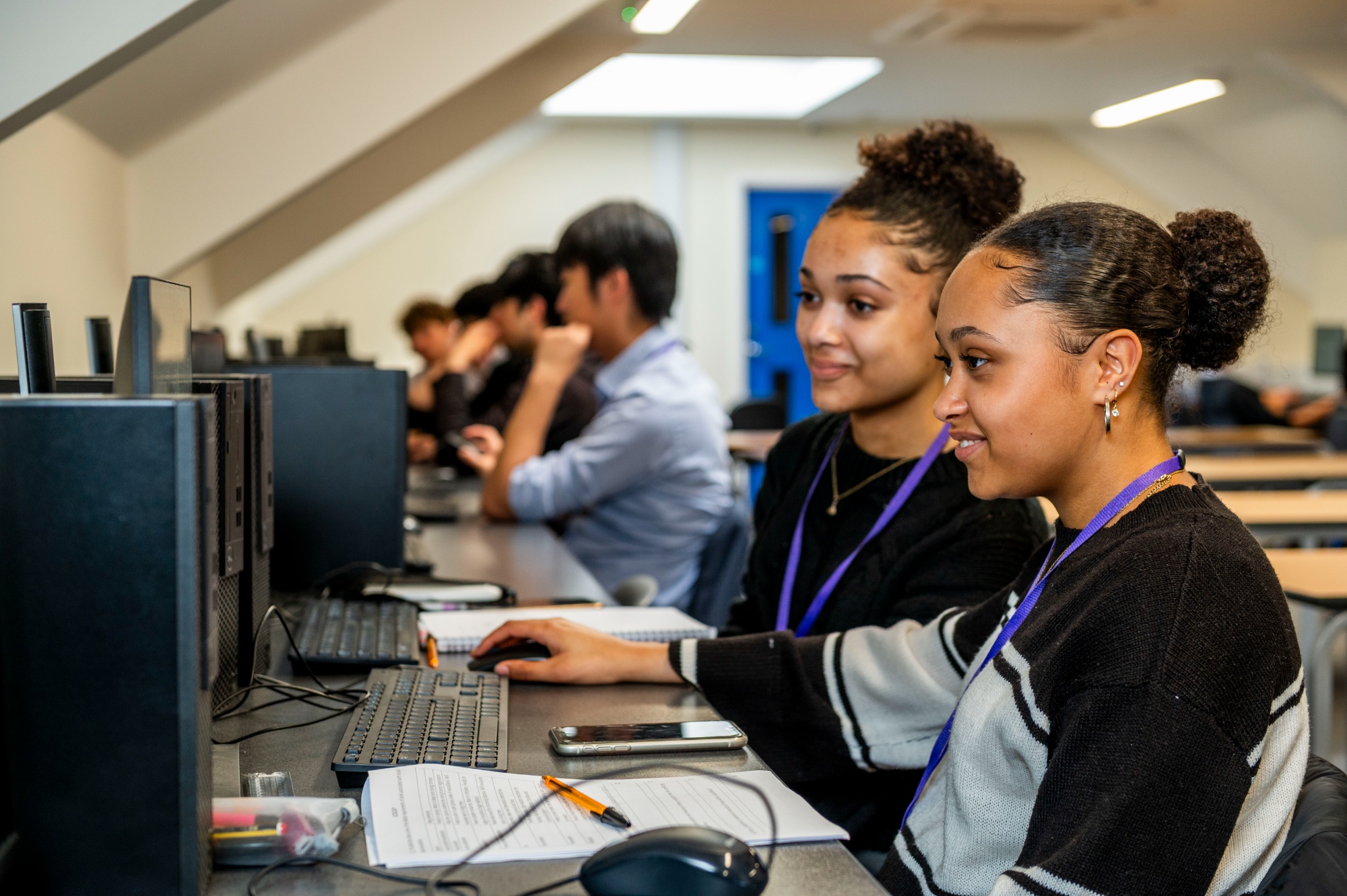
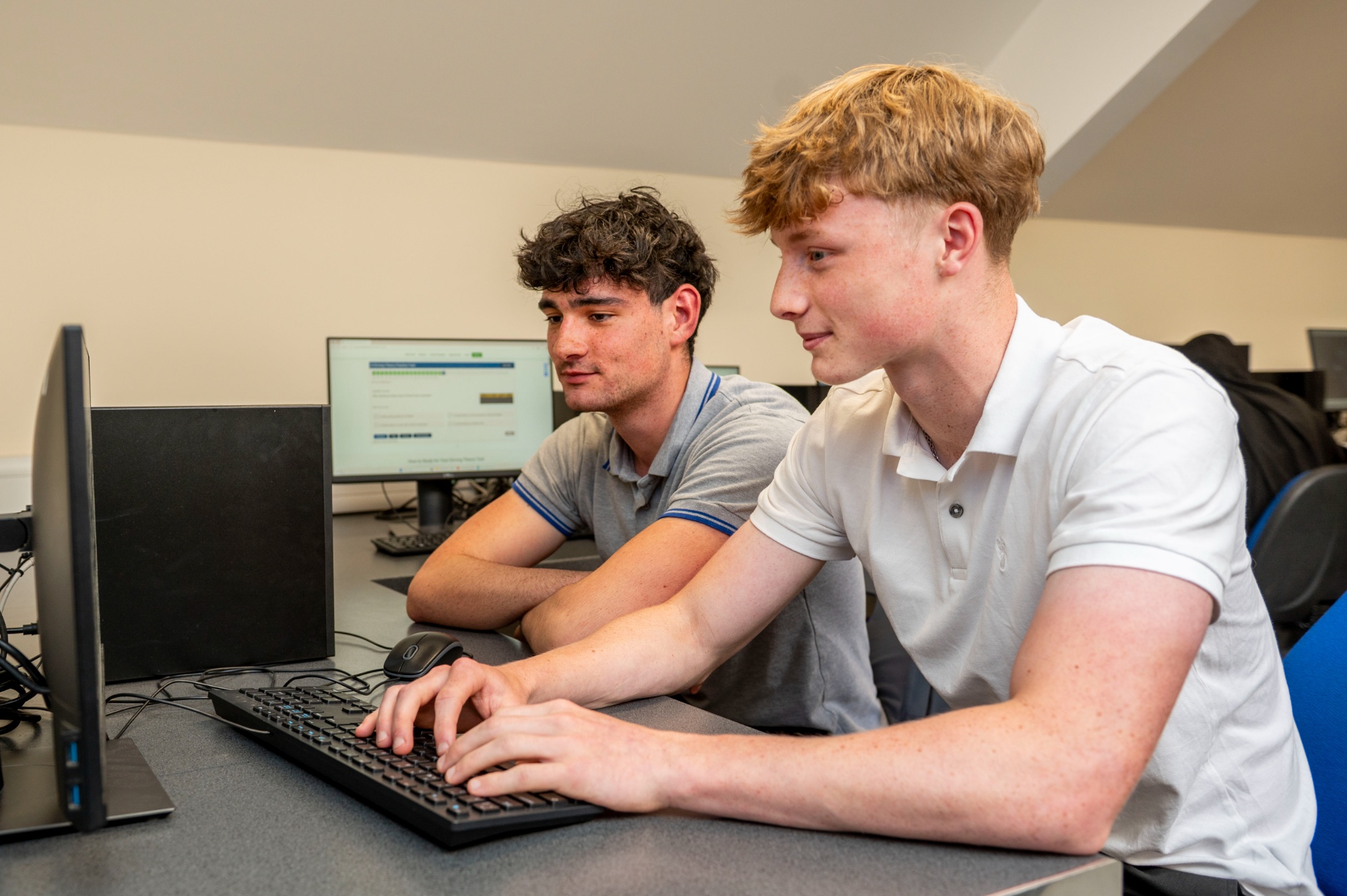
Key Stage 4 Options
iMedia – equivalent to 1 GCSE
iMedia is a Level 2 qualification in Interactive Media, providing full grade 9-1 equivalence. Students study two coursework units: web design and interactive multimedia products. In this course students are equipped with the knowledge and skills to work with information effectively, creatively and productively. There is one written exam.
Note for June 2021 there are changes to the specification.
Link to the exam board specification here.
GCSE Computer Science – 1 GCSE
Students study the OCR Computer Science syllabus. The course consists of two theory papers worth 100%: Paper 1 is on Computer Systems and Paper 2 on Algorithms and Prgroamming.
In Paper 1 students study theory topics such as Networks and Protocols; Network Security; Computer Systems; Data Representation and Computer Systems; in Paper 2 students learn about Algorithms; Programming Fundamentals; producing Robust Programs; Boolean Logic and Programming Languages and IDE.
|
What careers will the subject support? |
Which courses will the subject support Post 16? |
|---|---|
| Computer Science: provides you with the skills to become a game designer, design your own apps/ software programs, work in networking and in the technology department of the biggest companies in the world. Other careers include, computer technicians; computer engineers and data managers, many jobs are also available in the media industry. Why not even begin your own tech business! | A Level Computer Science |
| iMedia: advertising manager, animator, art director, digital graphic designer, digital imaging manager, Ebusiness consultant, multimedia designer, public relations manager, project manager, social media content manager technology support specialist web developer / manager, video games designer, theatre set designer. | BTEC ICT, A level Media, A level Photography |
| Useful GCSE Resources |
|---|
| Programming: Download the latest version of the free programming software - Python |
|
GCSE Text Book: GCSE Computer Science OCR Endorsed Text Book - Publisher PGOnline |
Design & Technology
Head of Department: Ms Bhaga
Please click here to view our Curriculum Map:
DESIGN & TECHNOLOGY curriculum map
In Design Technology, students work independently and co-operatively to complete a range of design and make assignments, based on real life situations. They produce quality products using a variety of different materials, tools and techniques. We help students to understand the effects and the importance of design and technology in their own society and globally. Students become informed consumers through product evaluation and solving real-world design problems.
Key Stage 3
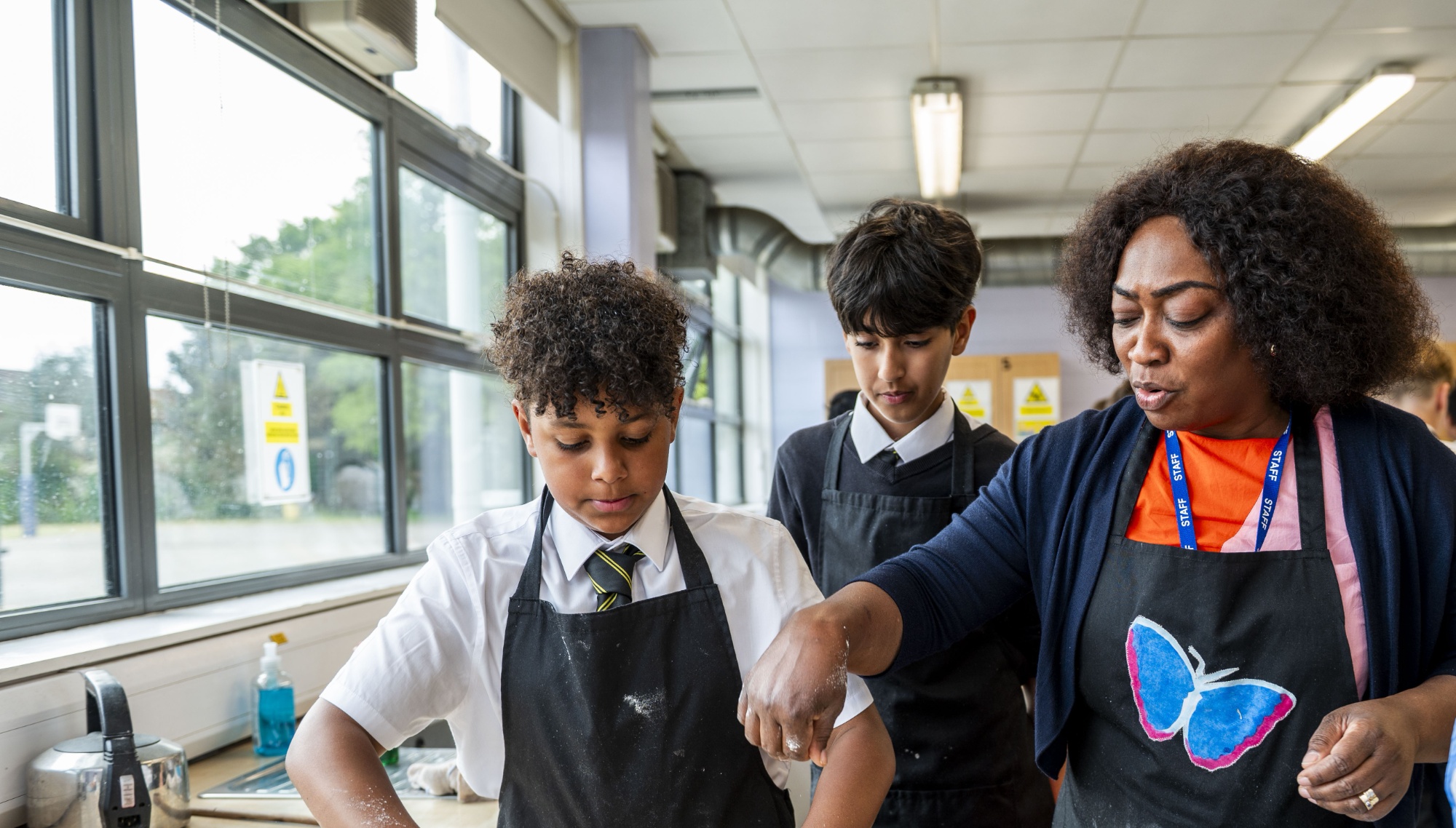

Students use resistant materials on a number of design and make projects such as; a desk tidy, cam car design, structures, electronics and modular box construction. Graphic materials will be used to develop and communicate advertising solutions and graphic product prototypes. Students will perform a critical analysis of existing products, whilst learning about those involved in the design and manufacturing industries. Students will learn about mechanical and electronic products and systems through focused practical tasks and testing. Students are also taught a range of skills and produce a variety of dishes in food technology. They also have the opportunity to create and make their own dishes.
Key Stage 4 GCSE
We offer GCSE Design Technology with technological disciplines based on Resistant Materials, Graphic Products, Electronics and Textiles.
In Year 10 and Year 11, there are three main areas of learning; Core Technical 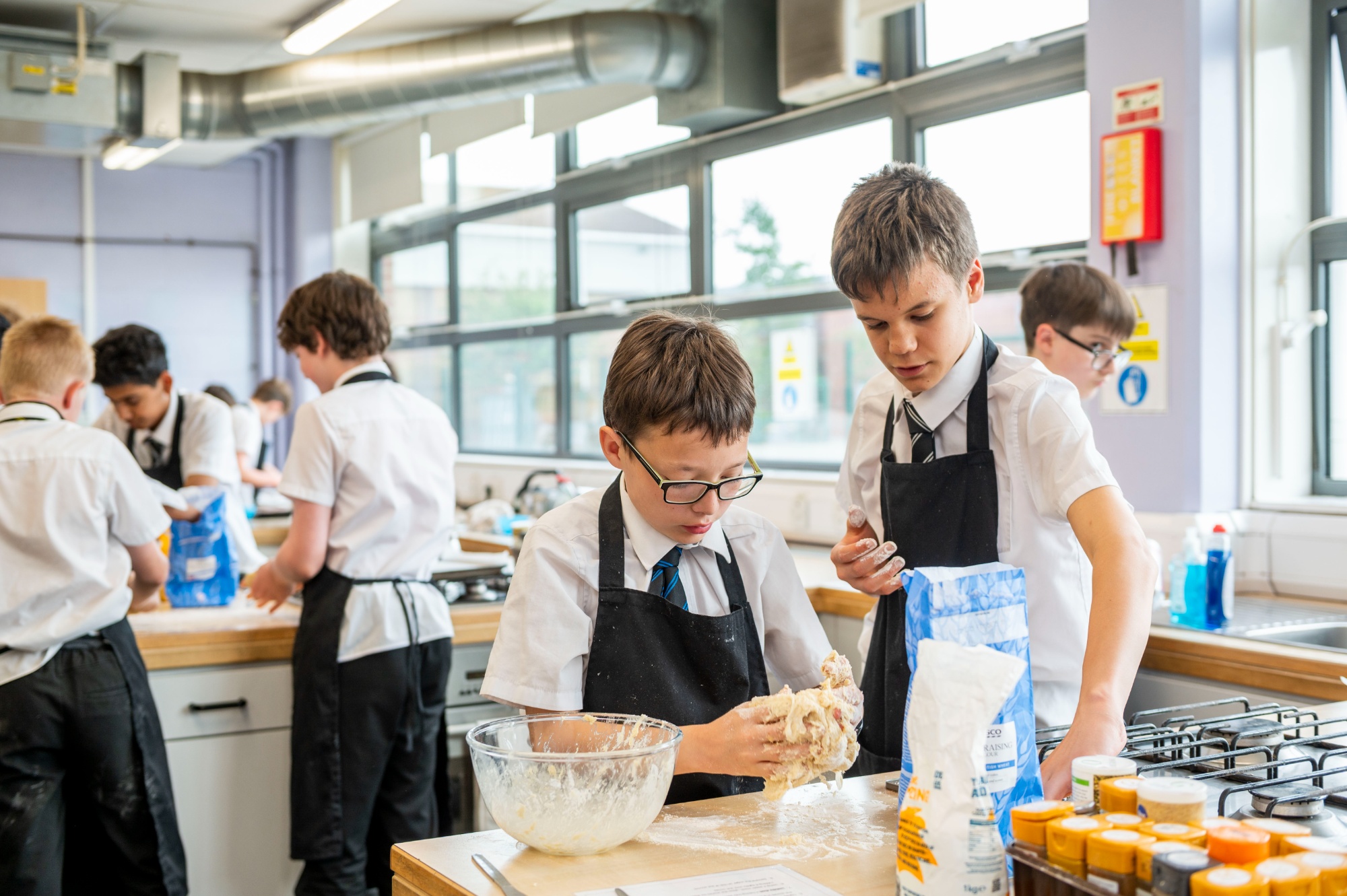 Principles, Specialist Technical Principles and Designing and Making Principles. They build on from their GCSE Foundation year in Year 9. We encourage students to develop their research skills in order to stimulate innovative designs. Students use workshop equipment and ICT (including CAD/CAM) facilities to create products that are suitable for batch and mass manufacture. Products range from lighting solutions to storage facilities, from shop displays to game prototypes and furniture. They learn modern computer graphic design software and produce creative solutions to design briefs.
Principles, Specialist Technical Principles and Designing and Making Principles. They build on from their GCSE Foundation year in Year 9. We encourage students to develop their research skills in order to stimulate innovative designs. Students use workshop equipment and ICT (including CAD/CAM) facilities to create products that are suitable for batch and mass manufacture. Products range from lighting solutions to storage facilities, from shop displays to game prototypes and furniture. They learn modern computer graphic design software and produce creative solutions to design briefs.
The assessment for the GCSE course is made up of 50% coursework and 50% examination.
| What careers will the subject support? | Which courses will the subject support Post 16? |
|---|---|
| Engineering, Architect, Robotics, Web Designing, Furniture design, Industrial design, Graphic Design, Product Designer, Entrepreneur, Gaming, Web design and many more | Graphic Design, Product design, Engineering, Art & Design, Architecture and many more |
| Useful GCSE Resources |
|---|
| Access to a computer, the library, LRC and other information sources such as the Internet, TV/video |
| Basic graphic equipment such as a pencil, black fine-liner, set square, compass, eraser, sharpener, craft knife, scissors, glue stick and coloured pencils |
Drama & Performing Arts
Head of Department: Ms Dawkins
Please click here to view our Curriculum Map:
performing arts curriculum map
To find out more about the Drama Department please watch our video:
The Drama Department at Rutlish is an exciting department within the school. Our ultimate aim is to develop students’ confidence, acting skills, creative and imaginative skills through the exploration of a variety of contemporary plays including, Blood Brothers, The Caucasian Chalk Circle, Missing Dan Nolan and The Crucible.
We delve into a range of themes and issues through expert dramatization and role-play. We aim to build the self-confidence of our students, as well as equip them with the necessary dramatic and performing skills required for a career in the performing arts.
Key Stage 3
At Key Stage 3, we offer students the opportunity to develop a range of drama skills, including improvisation and devising, through the use of explorative strategies and mediums that is stepped in the work of theatre practitioners such as Stanislavski and Artaud. Students are also given numerous opportunities to view live theatre shows in the West End, as well as participate in drama clubs and assemblies in order to develop their performance skills. They also take part in the annual summer production.
Key Stage 4
Our students thoroughly enjoy the GCSE Drama option which allows them the opportunity to analyse and perform scripted plays, using a range of costumes, props and lighting to engage and enthral their audience. Consequently, the GCSE course has been a great success within the school. The department is committed to preparing and motivating students for their GCSE examinations by using exciting materials, involving external theatre companies and organising visits to local theatres, in order for them to learn from the experts. We also aim to explore a variety of genres and issues, ranging from Peer Pressure and Society, to War and The Holocaust.
In this department, we also offer a BTEC Level 2 First Award in Performing Arts, which is equivalent to a GCSE qualification. This is especially significant for those boys who have an interest in both the production and performance aspects of the theatre. All students thoroughly enjoy the unit, not least because the emphasis is on developing practical skills, combined with smaller elements of written work.
The department has always been heavily involved other whole-school events, such as the Christmas carol service and school assemblies. We run drama clubs at KS3 and KS4, thereby allowing students the opportunity to develop their skills within a friendly environment during lunch and after school.

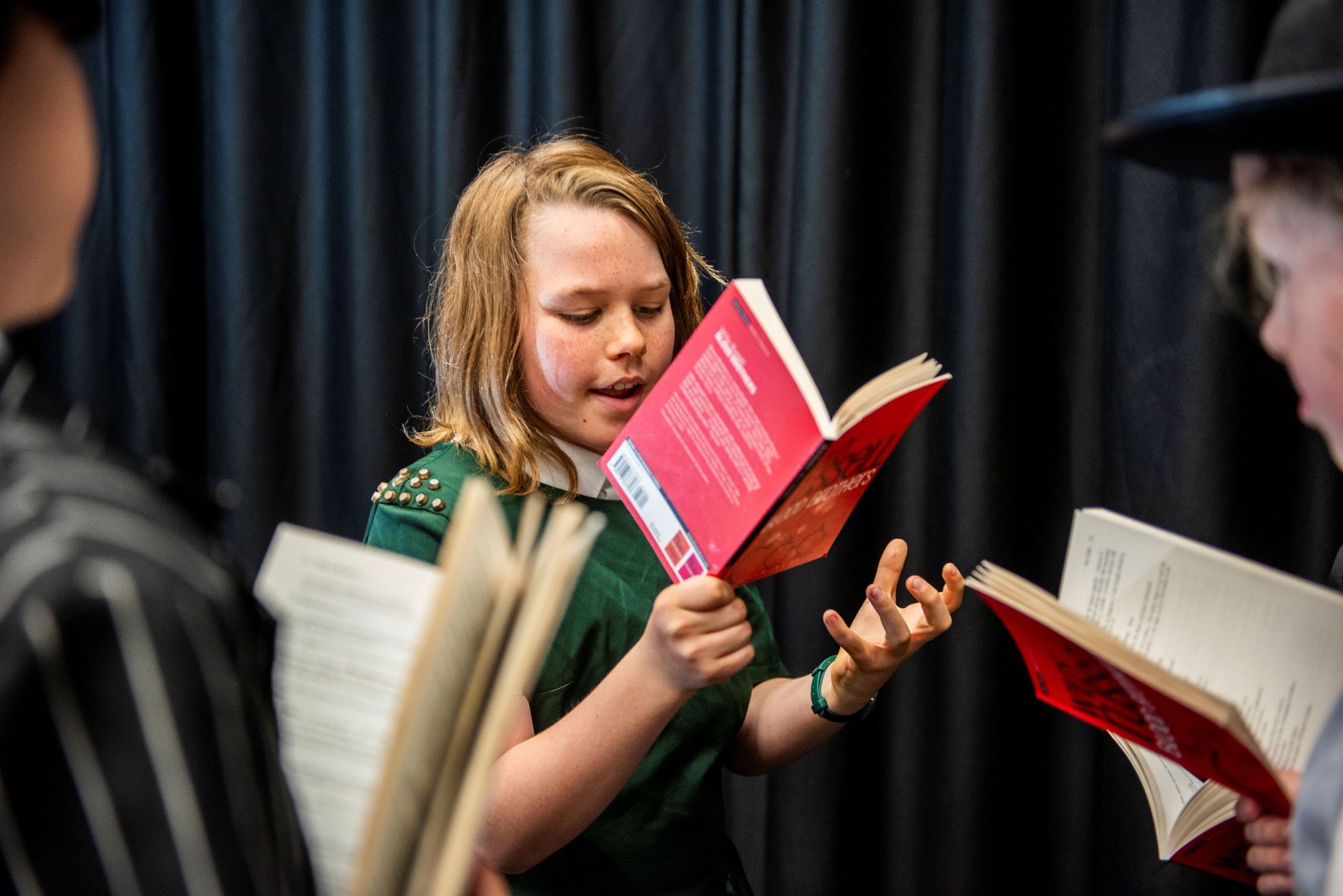
| What careers will the subject support? | Which courses will the subject support Post 16? |
|---|---|
| Students who study drama or performing arts can take advantage of a wealth of opportunities in the performing arts industry, job roles include script writer, director, actor, stage hand and front of house staff. | Students who take this course often progress onto the A Level Drama and Theatre Studies Course at college. Others may wish to develop their Practical skills with a BTEC Level 3 in Production / Performance. |
EAL
EAL Co-ordinator: Ms Morris (KS3) and Ms Batchelor (KS4)
Please click here to view our Curriculum Map:
The school provides additional support for students who have English as an additional language. Where appropriate, students have individualised programmes tailored to meet their needs. In-class support is also provided.
Additionally, there is an English Literary Heritage reading group that prepares students arriving in KS3 (from overseas, with little or no English) for the demands of the contextual component at GCSE level English Literature.
The EMAS room in the Progress Centre is where students from all ethnic, cultural and religious backgrounds can meet to develop their vocabulary, literacy and independent learning skills.
ESOL English skills for life
Pupils with little English can improve their English by completing an ESOL Skills for Life qualification. This reflects the skills, knowledge and understanding in English needed by non-native English speakers who are studying in the UK. They allow for progression across the levels of the National Qualifications Framework (NQF) at Entry Level, Level 1 and Level 2.
This course is primarily aimed at students who arrive from other countries late in KS4 with little English. It will also incorporate revision of other GCSE subjects so that students can achieve their full potential and understanding of subjects across the curriculum, particularly the English GCSE.
There are three units to the ESOL qualification – Speaking & Listening, Writing and Reading. Students can study at different levels depending on their ability. Many learners will not be ready for assessment of all modes at the same time or level. Learners can seek final accreditation at any time over the qualification period, for both the full qualification or for individual units. This flexibility enables learners to progress at their own rate and be assessed when they are ready. No portfolio of work is required.
Economics
Head of Department: Mr Dunn
Please click here to view our Curriculum Map:
Our Aims
Economics is a scientific study of how people and institutions go about producing and consuming goods and services, and how they face the challenge of making choices in a world of scarce resources. Our teaching team provides an opportunity for the student to acquire general knowledge of the methods by which goods and services are allocated and incomes are generated and why prices, employment, money and financial markets behave as they do.
Our main aim at GCSE is to prepare students to acquire knowledge and skills regarding how markets work and how the economy works. This in turn will encourage students to study A-Level Economics, which we offer in our Sixth Form. Students who go on to complete a degree in Economics may find employment opportunities in the public sector and public enterprises, the private sector, and regional and international organizations.
Key Stage 4 Provision
Our GCSE groups follow the AQA linear syllabus, delivered effectively by experienced and specialist teachers. The syllabus is delivered in eleven chapters. The first six chapters cover how markets work (Microeconomics), and prepare students for the Paper 1 exam which they take at the end of Year 11. The remaining five chapters cover how the economy works (Macroeconomics), and prepare students for the Paper 2 exam, which is also taken at the end of Year 11. Each paper is 1 ¾ hours, is worth 50% of the total marks, and demand a range of skills from students that include making calculations using formulas, drawing technical diagrams, and writing essay responses. More details regarding the syllabus can be found here.
Expectations
The department has high expectations of both students and teachers. Economics expects a high level of commitment to the students’ progress and development by teachers, fostering their enthusiasm for the subject. Self-study, further reading and homework completion to a high standard is a must. The overriding objective of the department is that teachers want to use their expertise and experience to deliver high quality, motivating lessons to bring this vibrant subject alive, making teaching and learning Economics both exciting and rewarding for all.
| What careers will the subject support? | Which courses will the subject support Post 16? |
|---|---|
| Economics is a well-regarded academic subject which is useful for any career. If you intend to study Economics at university then it is often advisable to study Mathematics to AS or A Level. Students who go on to complete a degree in Economics major may find employment opportunities in the public sector and public enterprises, the private sector and regional and international organisation. | Economics, Geography, Computer Science, Politics, Health & Social Care and Mathematics |
| Useful GCSE Resources |
|---|
| Exam board specification AQA | Economics | GCSE | Economics |
English
Head of Department: Ms Khan
Please click here to view our Curriculum Map:
English is taught in the Innes Building in its own suite of adjacent rooms. Media and a variety of other resources are readily available for use with all classes. The English Department staff consists of twelve specialist English teachers who teach across the whole age and ability range.
Students are taught in sets in all year groups and all lessons are differentiated to allow all students full access to the curriculum. We aim to stretch able students and support those who find the subject difficult. In many lessons, additional support is provided to ensure that our boys achieve their potential. Examination groups benefit from revision sessions and after school support from teachers.
Homework is regularly set and students are assessed with feedback given. We believe that students make best progress when they are given challenging tasks and clear advice on how to move their work forward. We aim to keep parents fully informed on their son’s progress and welcome parental support in helping their sons to achieve.
Students are encouraged to extend their work beyond the classroom through reading, display work and literacy competitions. Our aim is to ensure that all students achieve their potential in English and recognise this as important to succeed across all subjects. Our hope is that they enjoy the process.
Key Stage 3 Overview
Year 7
Autumn Term
Year 7 begin their journey into KS3 looking at Greek Mythology. The students learn the conventions of myths and how they were used in society. Alongside looking at existing Literature, the students work on their own mythological story, which adheres to the conventions they are learning. In the second half of the term, students are placed in ability sets and then move on to a class novel: incorporating a love for reading with analysis of text. The novels are specifically chosen by the class teacher to reflect the students’ ability and ensure it is accessible to all. Teachers vary reading tasks in the lessons and look at author’s craft with a reflection on how themes are conveyed.
Spring Term
Students are taught Nonfiction during this half term and are introduced to an array of persuasive and informative texts. Upon reading the text styles, our students identify the purpose, audience and text type as well as understand how to use and create their own text within a given topic. The next half term is based on Poetry from Different Cultures. Here poetry forms are introduced and each student attempts their own using the formulas discussed. As well as creating poetry, the students analyse how poets use their writing to convey messages and express their meanings on topics.
Summer Term
Similar to the differentiation in studying a novel, each class teacher chooses the most appropriate Shakespeare play for their class. The options are: A Midsummer Night’s Dream, Twelfth Night or The Merchant of 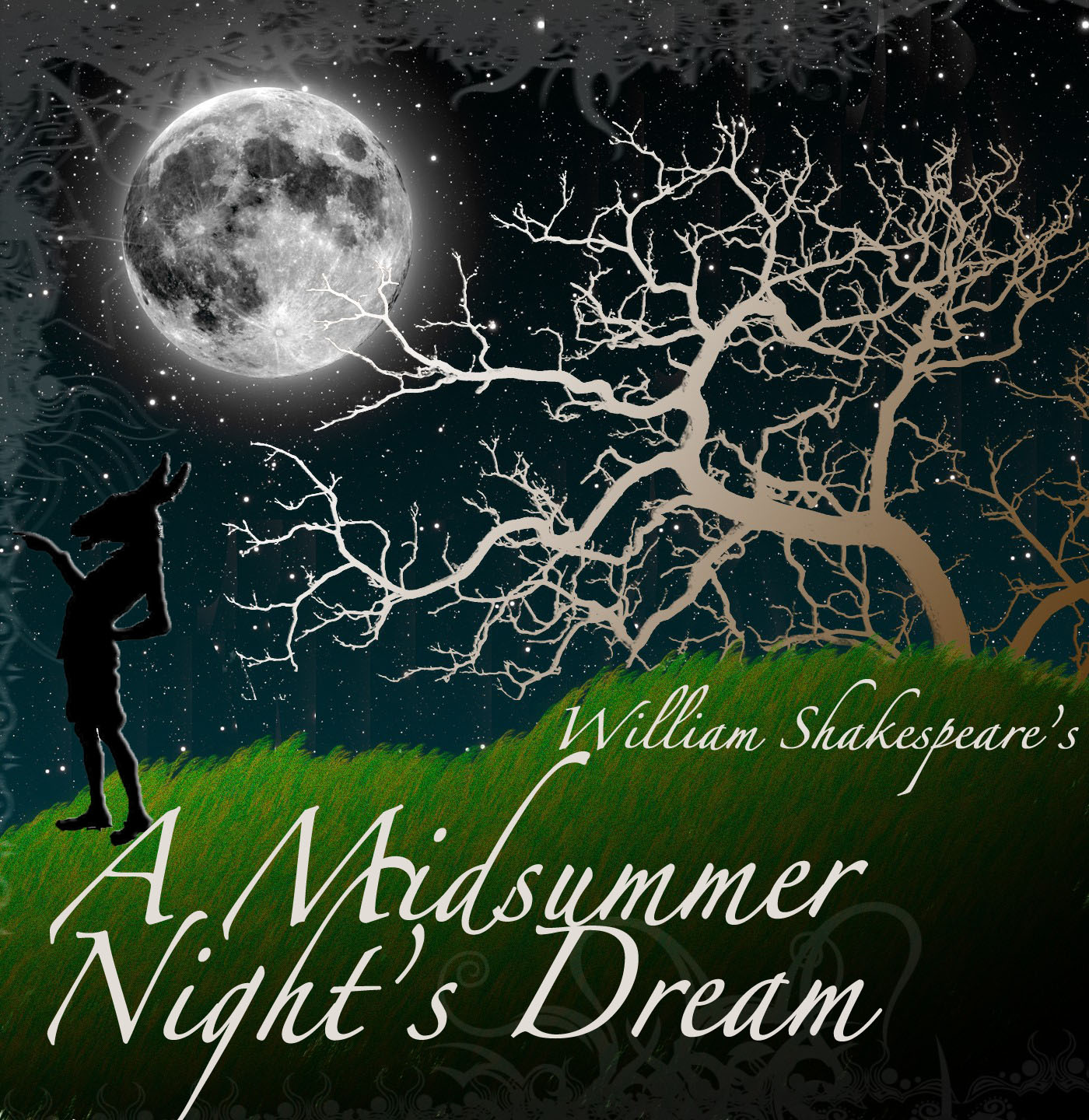 Venice. In this half term, Shakespeare’s unique methods are explored through re-enacting the play, learning some of the famous monologues and performing to each other.
Venice. In this half term, Shakespeare’s unique methods are explored through re-enacting the play, learning some of the famous monologues and performing to each other.
Given the changes in the new curriculum, the last half term of the year 7 is dedicated to teaching the boys age-relevant versions of the skills needed for English Language Paper 1 of the GCSE. Unseen texts are unpicked with a focus on language / structure analysis, evaluation and writing creatively. The students will be shown how the year’s topics all contribute to building skills towards this exam.
Year 8
Autumn Term
At the beginning of year 8, students start reading a class novel that is rich in description and has many themes for discussion. Based on this, they are given the opportunity to evaluate the effect of the writer’s methods on readers such as themselves. This skill is transferable to the end of unit exam as it directly has the same formula as question 4 of the English Language Paper 1. After half term, they delve into the Fantasy genre experimenting with the descriptive features that they were exposed to in the novel. While looking at Fantasy’s films, students are given the opportunity to create a story that turns everyday people and activities into a new realm using fantastical conventions.
Spring Term
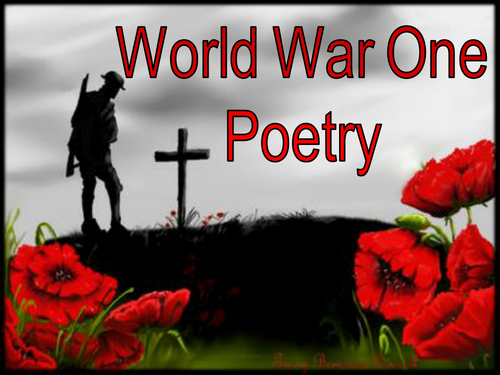 After Christmas, we begin WW1 poetry; at this time context is introduced as an element that shapes the poet’s meanings and messages. Students are able to see that the poet’s history and experience play a part in how effective a message is conveyed, whether it is propaganda, patriotism or actual combat experience. As a writing module students look at Nonfiction texts and their place in our everyday lives. They construct their own text and learn how to detect implicit and explicit messages and ideas. Through the study of non-fiction text types, students see the evolution of social media in blogs/vlogs, persuasive writing within speeches and writing non-biased reviews for broadsheet papers.
After Christmas, we begin WW1 poetry; at this time context is introduced as an element that shapes the poet’s meanings and messages. Students are able to see that the poet’s history and experience play a part in how effective a message is conveyed, whether it is propaganda, patriotism or actual combat experience. As a writing module students look at Nonfiction texts and their place in our everyday lives. They construct their own text and learn how to detect implicit and explicit messages and ideas. Through the study of non-fiction text types, students see the evolution of social media in blogs/vlogs, persuasive writing within speeches and writing non-biased reviews for broadsheet papers.
Summer Term
After Easter, Year 8 start to unpick their second Shakespeare text in secondary school. The texts are selected from ‘Much Ado about Nothing’ or ‘Twelfth Night’: dependent upon the ability of the class. All of the year group will look at Shakespeare’s form and understand the symbolic messages that can be explored.
The last topic studied is revision of the skills for the English Language Paper 1 exam (first introduced to them in year 7), during this time their focus on language / structure analysis, evaluation and writing creatively is developed, giving an opportunity to see progress from the year before.
Year 9
Autumn Term
Year 9 start the academic year appreciating the culture and context in Of Mice and Men. Throughout the study of the novella, their analytical skills are developed and they see the context of 1930’s America and how it influenced 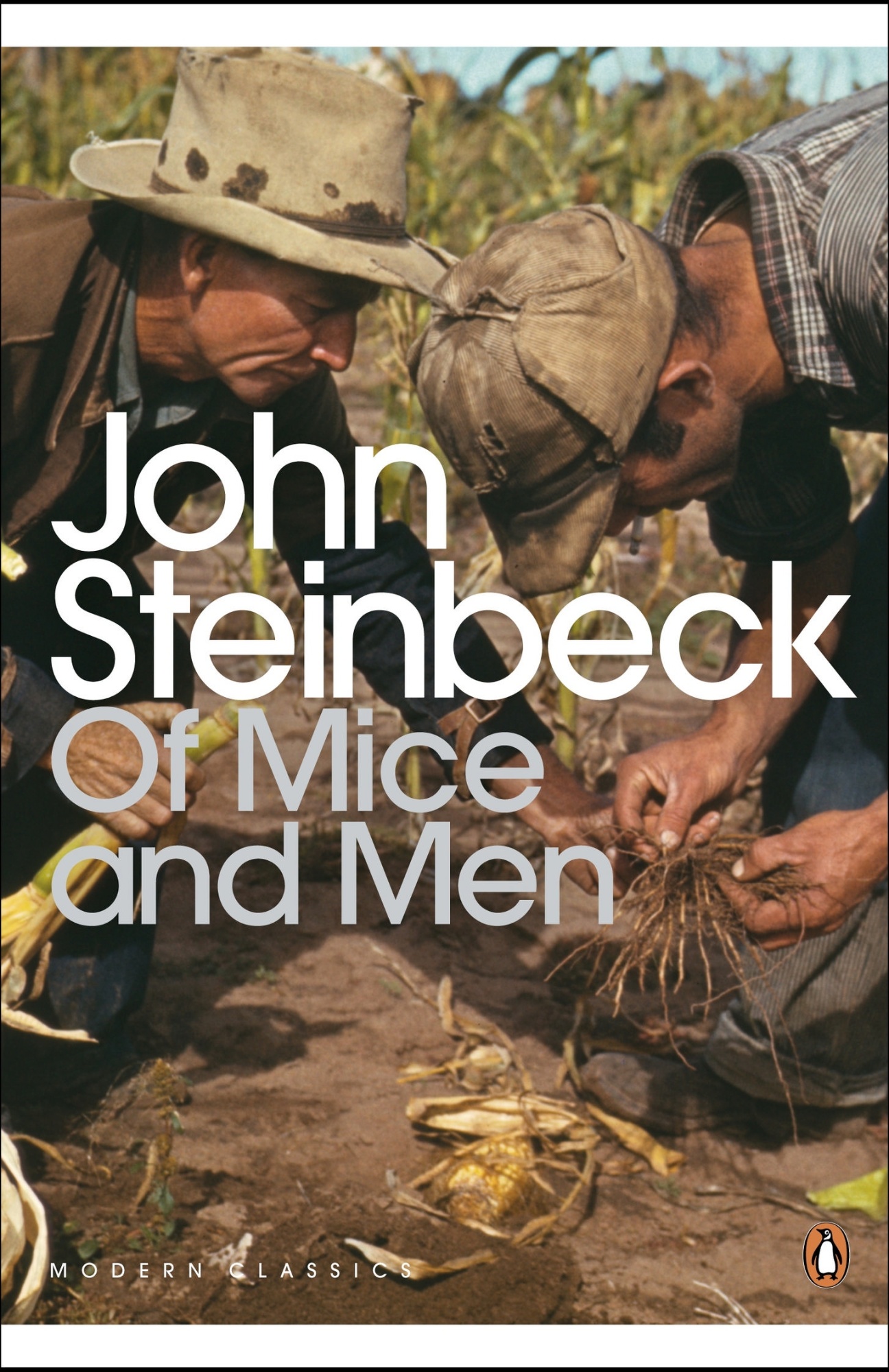 writers such as Steinbeck. The students take a critical approach to the novel, assessing how well the key themes and characters are portrayed and the effect they have on our understanding of the time-period. To develop their creative writing, year 9 then move on to study Gothic Literature and its conventions. An opportunity to use the transferable skills is evident during this time and by the end of the half term, they feel confident enough to recreate their own gothic story.
writers such as Steinbeck. The students take a critical approach to the novel, assessing how well the key themes and characters are portrayed and the effect they have on our understanding of the time-period. To develop their creative writing, year 9 then move on to study Gothic Literature and its conventions. An opportunity to use the transferable skills is evident during this time and by the end of the half term, they feel confident enough to recreate their own gothic story.
Spring Term
Shakespeare’s ‘Romeo and Juliet’ is studied next by the year group and they build their GCSE skills with learning quotes and writing essays based on the famous text. This module often has leeway for students to watch the play and develop a visual appreciation of the play. In order to further prepare the boys for GCSE, they study for and sit an English Language Paper 2 test, which has been produced by the exam board AQA, in the hall under, complete exam conditions. This exam, along with careful monitoring of progress and data, determines the initial GCSE sets that students are put into.
Summer Term
Power and Conflict poetry is the next module. At this time, they create presentations in small groups having researched the poem, their meaning and technical features.
Lastly, they end KS3 with a 19th century text ranging from Oliver Twist to Hound of the Baskervilles and enjoy being submerged into a different time-period in which society operated in an uncommon fashion to them.
Assessments
Each unit studied, baring the English language exam, has a midway assessment and an end of unit assessment in which students are prepped in the lessons for. Each assessment is followed by an in-depth feedback lesson for them to demonstrate progress.
Homework
Teachers set homework for each unit individually based on the topic area they are covering in the lesson. Students are also given literacy homework once a week.
Key Stage 4
Year 10
Specification: AQA English Language (8700) and English Literature (8702)
Autumn Term first half term:
English Language
Paper 1: Exploration of fiction texts
Students will learn how to:
- Explore how writers use language and structural features to create meaning
- Make perceptive inferences and deductions
- Consider how to interpret the text in different ways
- Craft their own writing style to suit different audience and purposes
- Use a variety of language and structural features to write an interesting, thoughtful and compelling story or description
Second half term:
English Literature
‘The Strange Case of Dr Jekyll and Mr Hyde’ by Robert Louis Stevenson 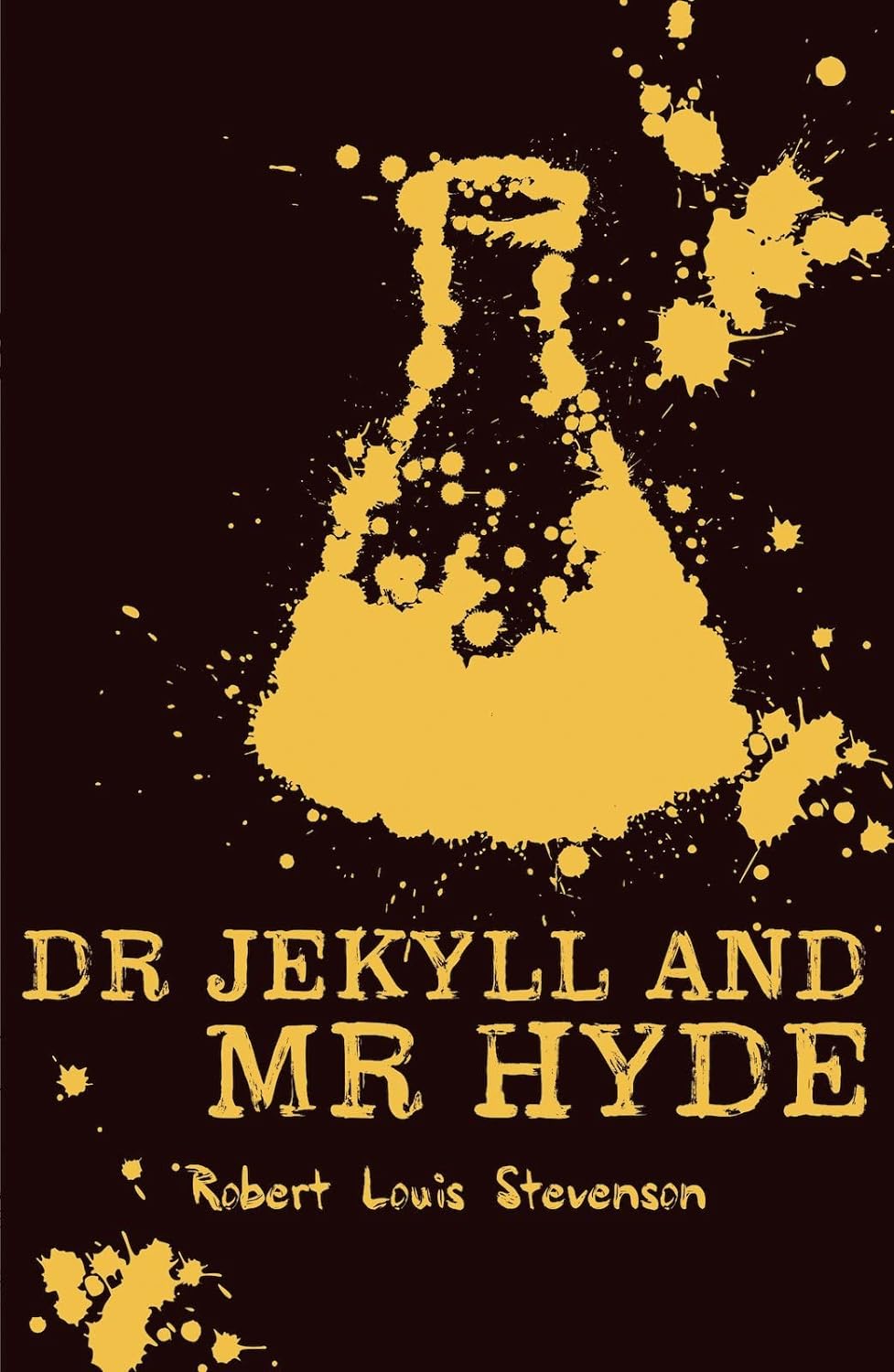
Students will explore:
- The central characters in the novel and what they represent
- They key themes of the novel and how/when they are shown
- Stevenson’s message to his readership and commentary on Victorian society
- How Stevenson uses language and structural features to create meaning
Students will be required to know key extracts in detail in addition to the narrative as a whole as the examination requires them to analyse an extract and then link these ideas to the rest of the novel.
Spring Term first half term:
English Language
Paper 2: Exploration of 19th century literary non-fiction and 20th/21st century non-fiction
Students will learn how to:
- Identify key information and ideas in a non-fiction piece of writing.
- Summarise the ideas of two non-fiction texts from different time periods
- Explore how a non-fiction piece of writing uses language to convey meaning
- Compare the differing perspectives and viewpoints of two non-fictions texts
- Craft their own writing style to suit different audiences and purposes
- Use a variety of language and structural techniques to write a speech / article / letter to argue or persuade effectively
Second half term:
English Literature
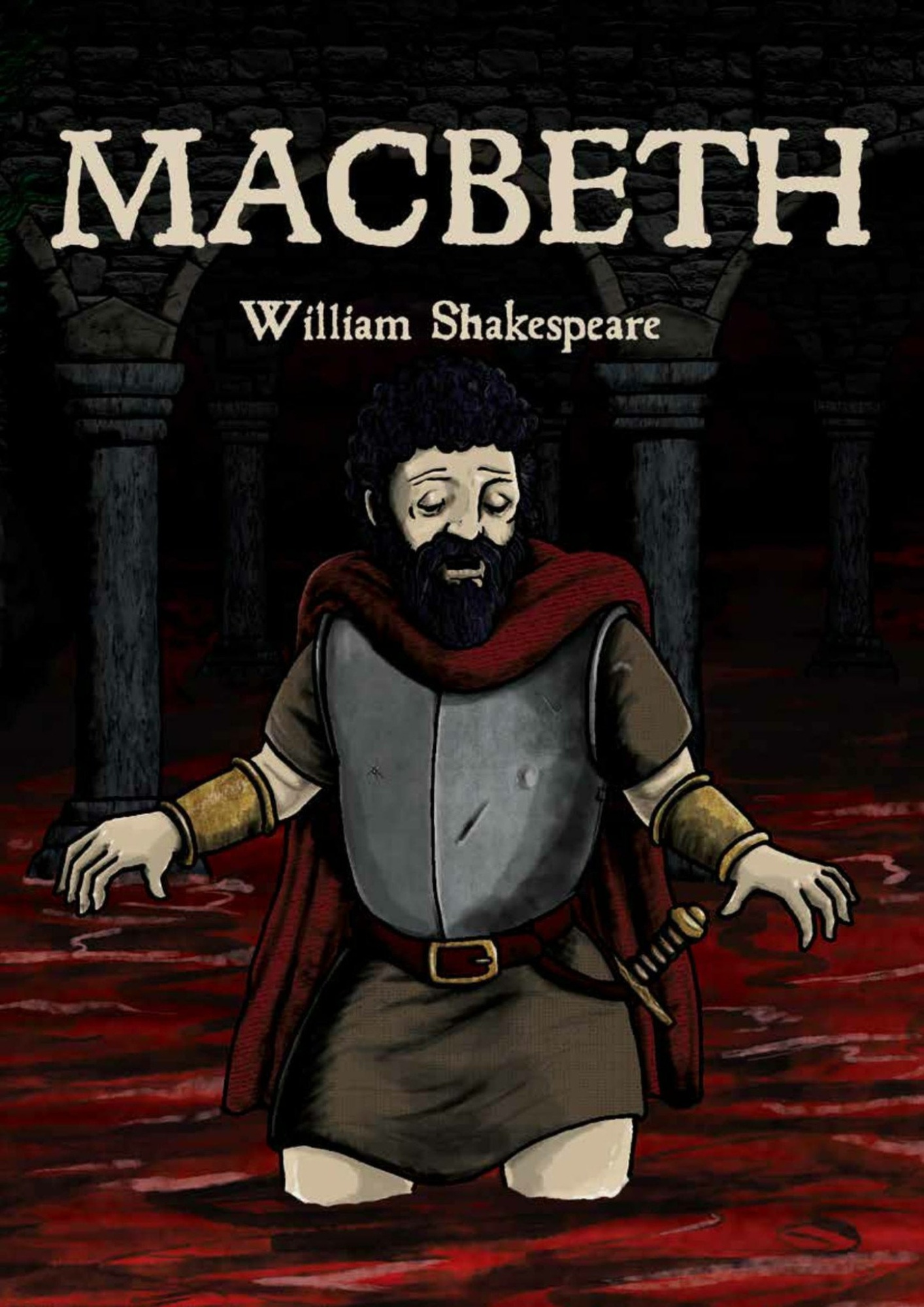 ‘Macbeth’ by William Shakespeare
‘Macbeth’ by William Shakespeare
Students will explore:
- Central characters and what they represent
- Key themes of the play and how / when they are shown
- Shakespeare’s message to the audience and his commentary on Jacobean society
- How Shakespeare uses language and structural features to create meaning
Students will be required to know key extracts in detail in addition to the narrative as a whole as the examination requires them to analyse an extract and then link these ideas to the rest of the play.
Summer Term:
First half term:
We continue studying Macbeth to finish the play. Students focus on their writing style and practicing exam technique by working on their AO1, AO2, AO3 and AO4 skills. Students explore different key passages of the play and revise quotations and analysis to prepare for the exam.
Second half term:
‘An Inspector Calls’ by J.B. Priestley: students will explore: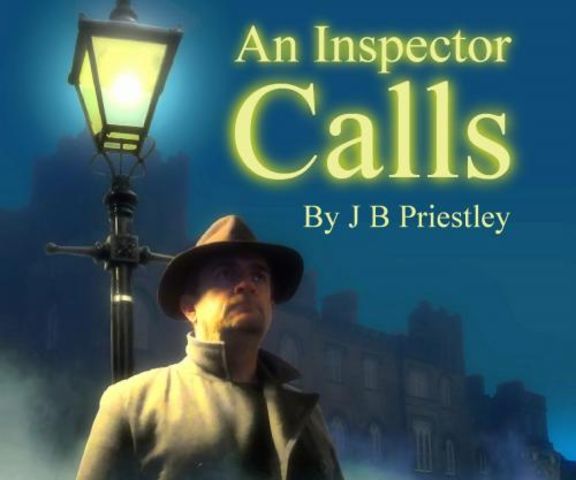
- Central characters and what they represent
- Key themes of the play and how / when they are shown
- Priestley’s message to the audience and his commentary on Post-War Britain
- Priestley’s own political and social beliefs
- How Priestley uses language and structural features to create meaning
Year 10 Assessments:
Students complete practice assessments in class or in the hall each half term.
Students will complete the Speaking and Listening endorsement in the final weeks of this term. They will be required to write and deliver a speech arguing about a topic of their choice. At the end of the speech they have the opportunity to answer questions about what they have spoken about from their teacher and peers.
Year 10 Homework:
Homework and revision materials are set by teachers in class every week. Students are also given Language and Literature ‘Study Booklets’ to be completed at home and brought back into class to be marked and their answers improved.
Year 11
Specification: AQA English Language (8700) and English Literature (8702)
Autumn Term first half term:
English Literature
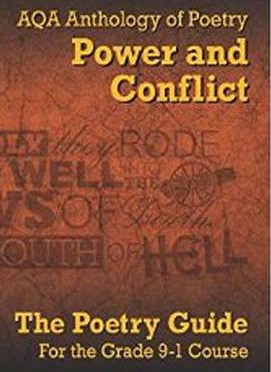 AQA Power and Conflict Poetry Anthology (Section B) and Unseen Poetry (Section C)
AQA Power and Conflict Poetry Anthology (Section B) and Unseen Poetry (Section C)
Section B: ‘Power and Conflict’ cluster
Students are provided with the AQA ‘Power and Conflict’ anthology consisting of 15 poems to learn in class. Each poem links to the themes of power, conflict and /or identity. Students are given one poem from the collection in the exam and asked to compare it with another of their choice.
Students will learn to:
- Consider the subject and meaning of each poem
- Analyse the presentation of power / conflict / identity in each poem
- Compare and contrast the poems exploring how they present the central themes in similar and different ways
Section C: Unseen poetry
Students will learn to:
- Read an unseen poem and understand the subject and meaning
- Explore the key themes in the poem and how they are presented
- Analyse the language, form and structure of a poem and discuss how they create meaning
Second half term:
English Literature and English Language Revision (in preparation for the December Mock Exam)
Students use their exercise books and Study Booklets from Year 10 to revise for each exam. In addition, they are given a Year 11 Revision Booklet per topic to supplement their knowledge and provide additional example answers and opportunities for writing practice.
Mock exams:
- Language Paper 1:
Exploration of fiction texts - Literature Paper 2:
Section A: An Inspector Calls
Section B: Power and Conflict poetry
Section C: Unseen Poetry Analysis
Overview Spring Term:
English Literature and English Language Revision (in preparation for the February Mock Exam)
Students use their exercise books and Study Booklets from Year 10 to revise for each exam. In addition, they are given a Year 11 Revision Booklet per topic to supplement their knowledge and provide additional example answers and opportunities for writing practice.
Mock exams:
- Language Paper 2:
Exploration of 19th and 20th / 21st Century literary non-fiction and - Literature Paper 1:
Section A: Shakespeare – Macbeth
Section B: 19th Century Novel- A Christmas Carol (Dickens)
Overview Summer Term:
Revision of all exams (English Literature and English Language) in preparation for the GCSE exams starting in May.
Students will use the following resources for revision:
- Year 10 exercise books
- Year 10 Study Booklets
- Year 10 class / mock exams and feedback
- Year 11 Revision Booklets
- Year 11 mock exams and feedback
- Resources uploaded to Fronter
- Revision sessions: weekly registration boosters, weekly after school sessions, Saturday sessions starting in Spring 1, Easter holidays revision, May half-term revision
Year 11 Assessments:
Students complete assessments every half term. The assessment in Autumn 1 (Poetry) is an in class assessment, all other assessments are completed in the hall in the form of Mock Exams.
By the end of Spring Term, students will have completed a mock for each GCSE exam: English Language papers 1 and 2 and English Literature papers 1 and 2
Year 11 Homework:
Students are given weekly homework tasks. They are also required to complete practice answers at home which are improved during lessons using teacher feedback and model answers.
Other resources
Websites:
- GCSE Pod https://www.gcsepod.com/
- Doddle Learn https://info.doddlelearn.co.uk/index.html
- BBC Bitesize: http://www.bbc.co.uk/education/subjects/zr9d7ty
- Mr Bruff https://www.youtube.com/user/mrbruff
- Shmoop Revision http://www.shmoop.com
- Spark notes http://www.sparknotes.com/
Revision Guides:
- CGP Revision Guides (AQA)
- York Notes Revision Guides (AQA)
Books, Articles and other Resources:
- Daily newspapers
- KS4 reading lists for non-fiction and fiction books to read at home
- LRC – recommended reads (fiction and non-fiction available)
- LRC- The English Review (e-magazine)
- LRC – York Notes and CGP study guides for reference / borrowing
| What careers will the subject support? | Which courses will the subject support Post 16? |
|---|---|
| Journalism, Law, Writer, Teacher, Publishing / Editorial work, Marketing | Students are encouraged to get at least a grade 6 in order to apply for some courses in the 6th form: History, Psychology etc. They can also go on to study: English A Level, Media A Level / BTEC, Film Studies A LEVEL / BTEC, Creative Writing courses, Journalism |
| Useful GCSE Resources |
|---|
| CGP AQA Study Guide Language Papers 1-9 |
| CGP AQA Revision/study guide for each text |
| A larger (i.e. not pocket sized) dictionary for home use |
| BBC Bitesize website |
| Practice exam papers at home. |
| Revision page on Rutlish365 |
| GCSE Pod |
| Own a copy of GCSE texts |
Extended Project Qualification
Lead Teacher: Mr Brogan
Please click here to view our Curriculum Map:
Geography
Head of Department: Mr Redzepagic
Please click here to view our Curriculum Map:
Our Geography Department is a dynamic, innovative and enthusiastic part of the Humanities faculty. The teaching team aim to engage students in discovering and enquiring about the world we live in; to help them ask questions about human and natural environments; to develop a sense of place and explore different societies and cultures around the world; their values, rights and responsibilities to other people and the environment.
The Geography Department is situated in the Centenary building and has extensive interactive resources making teaching and learning more enjoyable. To support students with research and additional learning, some lessons are taken in the cross-curricular ICT suite in the main building. We use a wide range of teaching methods to motivate students to achieve their best learning, including visiting speakers, DVD and internet analysis, group work and discussion, role play, power point presentations and Promethean flipcharts as well as creative display and artwork. Fieldtrips are an important element to the department. Over the last few years, we have visited the West Coast of USA, Bay of Naples in Italy, an eco-trip to Costa Rica, Iceland, New York and South Africa. We are very well resourced with text books for every student, gifted and talented packs, less able packs, supportive literacy writing frame booklets, DVDs, starter activities and also artefacts to ignite enthusiasm. The department is full of colourful display and reflects the content and dynamism of the subject.
At Rutlish School, opportunities are given throughout KS3 to reinforce and revisit topics studied during the KS2 programmes of study. This is strengthened through the use of topics that correlate to KS3 NC for Geography to build on prior knowledge, offer depth and breadth of study, ensure pupil progress and opportunities to practice.
Place knowledge is reinforced through an ongoing topic of the UK, emerging countries and the world, as well as in depth studies of China, Brazil and MINT countries. Both human and physical aspects are covered when studying these countries. For example, weather and climate zones, rivers, glaciers, volcanoes and earthquakes are examined, as well as settlements, land use, economic activity and biomes of tropical rainforest and tundra.
Map work is reinforced in Year 7, including directions, grid references, symbols and keys. Numeracy skills are used frequently and these correlate to Mathematics where application of skills such as ratios, mean, median, etc are utilised. Plans and graphs are used to record information, and digital technologies are utilised to research and record results. Literacy skills correspond to English Language through the use of PEEE paragraphs, analytical and creative writing as well as decision making exercise through the use of problem solving skills. There is a strong onus on the use of key terminology and SPAGG. The PLT skills link to History through the UK and the Africa topics and each KS3 topic relates to the SMSC and well-being of our students.
Key Stage 3
In KS3, students’ understanding of ‘location’ is ongoing, and incorporated into targeted themes and topics. For example, spatial awareness of the world’s countries is developed through a focus on current affairs, including disease/ famine in relation to Africa, current geopolitical affairs in the MINT countries, and the economics through the UK and China. The environmental regions of these countries are also studied during the topic of Natural Environments. Geographical similarities and differences are considered in relation to an NIC – Newly Industrialised Country, (Brazil) and an MEDC – More Economically Developed Country, (the UK).
In relation to physical processes, rivers and glaciers are studied in Year 7, coasts and weather & climate in Year 8 as well as soils and rocks and Tectonics in Year 9. Climate change, Antarctica and Biomes are taught as environmental Geography.
The concepts of natural processes of erosion, deposition and transportation area of study are revisited throughout the key stage to show clear trajectory between these and the physical landscapes in the UK and the world.
Human geography is covered in a study of the primary, secondary and tertiary sectors in Year 9, and in Year 9 this is developed into a study of population and urbanisation in relation to China and Brazil. The use of natural resources is also examined when considering economic activity in the UK, China, Brazil and MINT countries.
Human geography is covered in a study of the urbanisation in Year 8 and revisited in primary, secondary and tertiary sectors in Year 9 topic of Economic Development, as well as Population change in Year 9 in relation to the developed and developing world. The use of natural resources is also examined when considering economic activity in China, Brazil and the UK.
Understanding how human and physical processes interact is examined throughout Year 7, 8 and 9. The careers links are evident throughout each topic and are cross referenced in LP to accentuate career path destinations and opportunities for the future learning.
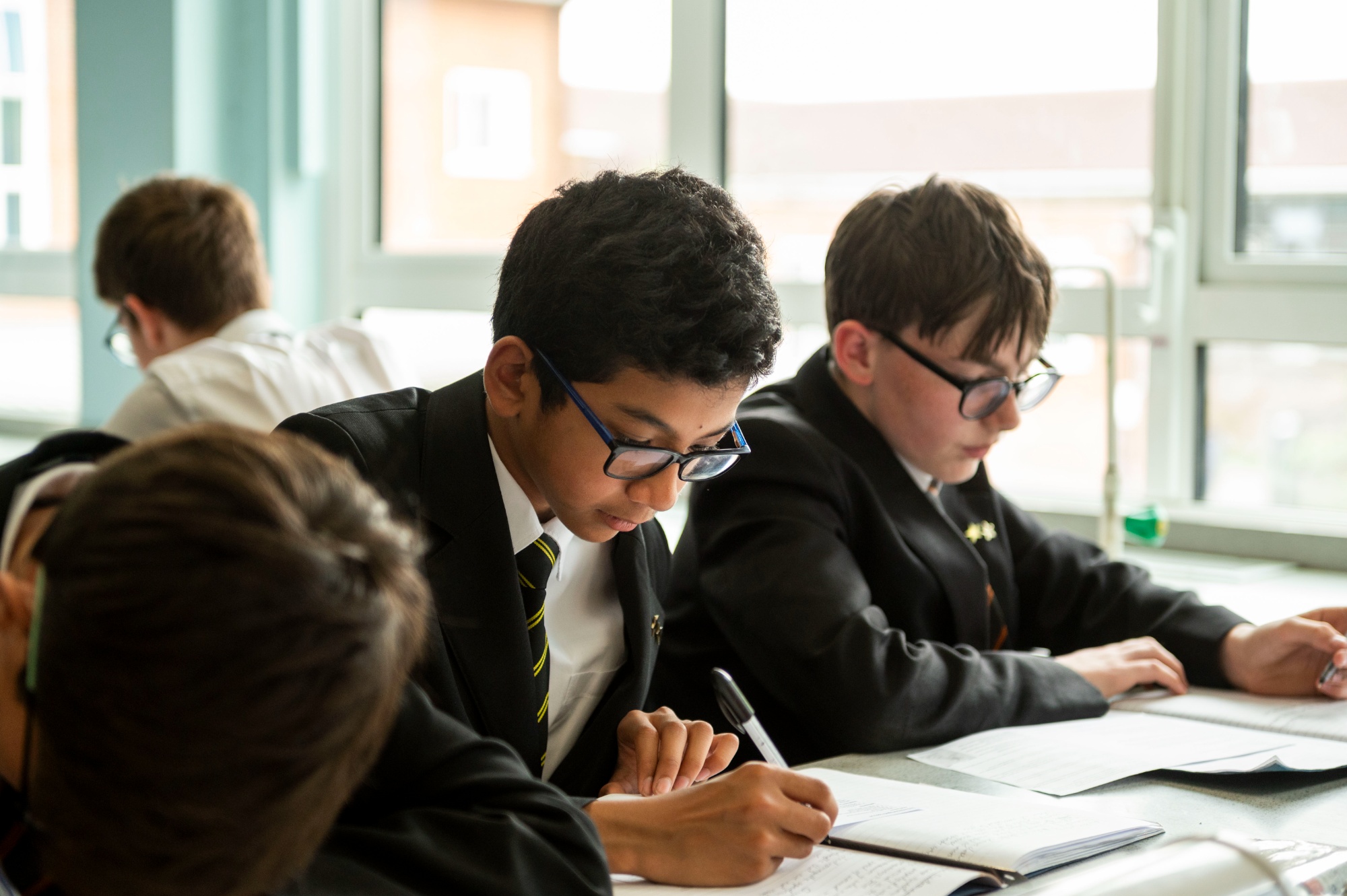
Key Stage 4
Geography department aims to provide students with the knowledge and skills that radiate and build from their prior KS2 & KS3 knowledge to be successful global citizens at the end of Year 11. Through our sequences of learning experiences, on and off-site, students will continuously work out how the world works and how it can and will change in the future. Students will learn about places that are outside of their own experience, they will develop their understanding of the world’s diversity of environments, peoples, cultures and economies. They will develop the understanding of being a citizen of a ‘global village’ so that they can challenge stereotypes and understand the fluidity of key ideas and concepts.
In classroom, students will observe the world objectively and go beyond their everyday experience. Students will be prompted to develop a deep and descriptive conceptual world knowledge that enables them to explain relationships in both the natural and human environments. The students will then utilise the knowledge and be equipped with the tools to think through alternative social, economic and environmental futures for a range of places.
| What careers will the subject support? | Which courses will the subject support Post 16? |
|---|---|
| Studying geography is a brilliant step towards a wider range of higher education courses and/or employment opportunities. Geographers can go into a wide range of jobs, including; advertising, education, environmental work, climate research, hazard management, business management, finance, law, marketing, retail / sales, social / health services, travel and tourism | Geography, Economics, Biology, Business Studies, Further Mathematics, Politics, History, Mathematics, Modern Languages and Sport |
| Useful GCSE Resources |
|---|
| GCSE (9-1) Geography specification B: Investigating Geographical Issues: ISBN: 9781446927762 |
| Revise Edexcel GCSE (9-1) Geography B Revision Guide: ISBN: 9781292133782 |
| The National Geographic magazine website or BBC GCSE Bitesize |
| The WorldMapper website |
| The Royal Geographical Society’s Geography in the News website |
History
Head of Department: Mr Davut and Mr Brogan
Please click here to view our Curriculum Map:
Why study History?
It has always been said that ‘in order to learn about today you must understand what happened yesterday.’ This is why History is so important. It will equip your child with the knowledge to interpret events that are happening today and put them into an historical context, enabling us to learn from the past.
They will learn how to use his factual knowledge and understanding to describe past events, people and societies. Also, they will learn that History has been interpreted in different ways and the differences need to be analysed and evaluated in order to understand sources of evidence. History will also develop your child’s ability to write descriptively, discuss argumentatively and present fluently. Your child will therefore develop a wide range of skills, which are essential outside of the History classroom and will form the basis of many careers.
Who and what is the History Department?
The History Department at Rutlish is an energetic, forward thinking department that is renowned for its high achievement and commitment to developing the all-round education of the students at the school.
The department is based in the Centenary building as part of the Humanities “faculty”. We have five full-time Historians’ in the department all of whom contribute to its development. This wide range of expertise will provide students with the best teaching possible to provide the skills necessary to progress to advanced level and university study or just to enjoy the subject whatever their ability. We will provide them with a variety of teaching methods and styles to create a full, wide ranging, learning environment in which they can experience the best that History has to offer!
The high standards provided by our teachers are mirrored in the work and expectations of all our students. The department is regularly developing through professional development to make sure that students benefit from new initiatives available in the teaching of History.
How will we teach your son?
The History Department uses a variety of different teaching methods to motivate all of its students to achieve the best grades possible. In class we have a variety of up-to-date textbooks and teacher prepared worksheets to develop your child’s subject knowledge and skills. We use the internet for projects and have web-based learning assignments each term.
All classrooms have interactive white boards which allow us to use an even greater variety of teaching methods and resources. Students regularly learn by role-play, debates and cross-curricular activities in order to develop their learning skills in a motivational atmosphere. We also use an ever-increasing selection interactive resources and artefacts, to complement our teaching. We are committed to extra-curricular and hope to offer students an opportunity to participate.
What will your child learn?
A t Key Stage 3 we follow the new National Curriculum for History. In Year 7 we start with a History Skills unit which we return to throughout all key stages. By the end of Year 9 we study Political Ideology, World War II and 20th Century Conflicts. The course develops chronologically and thematically and is taught through a variety of teaching methods from knowledge based learning, interpretation and evidence study. This allows us to help students to develop his ability to interpret, analyse, describe and evaluate sources of information thus helping your son achieve.
t Key Stage 3 we follow the new National Curriculum for History. In Year 7 we start with a History Skills unit which we return to throughout all key stages. By the end of Year 9 we study Political Ideology, World War II and 20th Century Conflicts. The course develops chronologically and thematically and is taught through a variety of teaching methods from knowledge based learning, interpretation and evidence study. This allows us to help students to develop his ability to interpret, analyse, describe and evaluate sources of information thus helping your son achieve.
At Key Stage 4 we currently follow the AQA syllabus B in GCSE History. Following the History syllabus changes since September 2016, we teach the following four units:
- Germany 1890 to 1945
- Conflict in SE East Asia 1950-1975
- Britain Power and the People 1100’s to the present Day
- Restoration England 1660 – 1685
The students will develop their essay writing and source analysis skills for the examination and will also learn to present well-argued debates. The History Department at Rutlish welcomes your child to learn about the past in a school so famed for its men in History as evidenced by the war memorials located in the Main Hall and the Innes Building.
| What careers will the subject support? | Which courses will the subject support Post 16? |
|---|---|
| Law, journalism, civil service, academia, teacher, archaeologist, heritage industry | History, Politics, International Relations, Law, English, Geography, Media and Journalism |
| Useful GCSE Resources |
|---|
| Understanding the Modern World Ferriby, Martin and Walsh ISBN 978 1 471862946. |
| Oxford AQA GCSE History also produce “Germany 1890-1945” and “Conflict in Asia 1950-1975” as single volumes |
| Power and the People, Alf Wilkinson ISBN 978 1 4718 6151 2 |
| For Restoration England Oxford AQA British Depth Study 1066 – 1685 Waterson and Williams Lena Clarke ISBN 978 0 19 8370123 |
| GCSE BBC Bitesize |
Mathematics
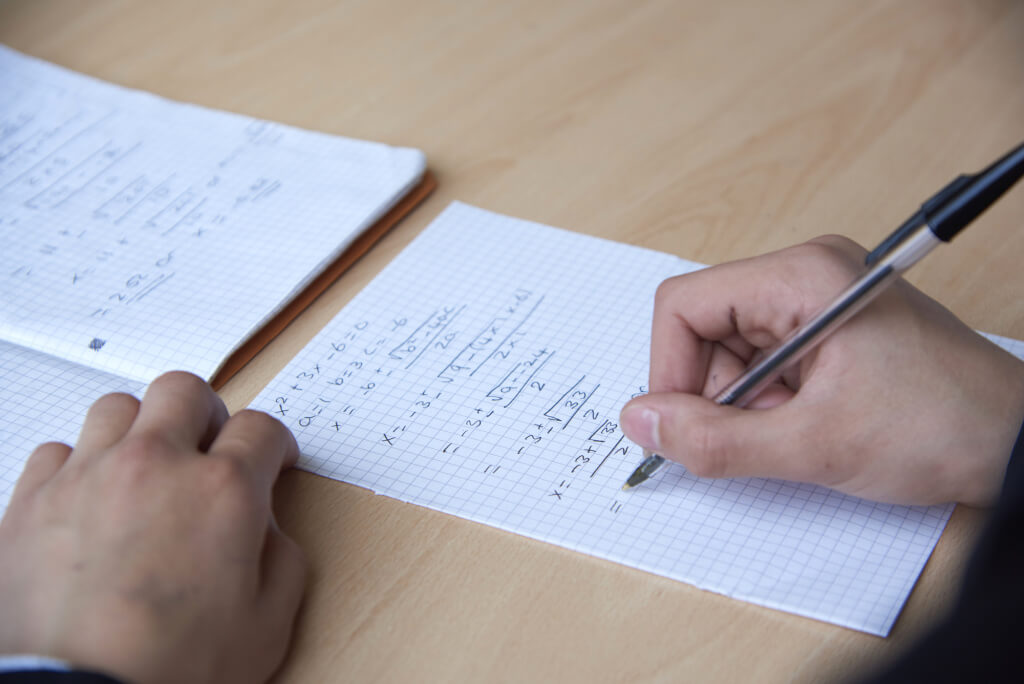
Head of Department: Mr Pryce
Please click here to view our Curriculum Map:
Mathematics at Rutlish is taught in a suite of 12 rooms in the Main Building. Our schemes of work are designed not only to cover the National Curriculum and the examination syllabus, but also to offer opportunities for each student to encounter group and paired activities and to take part in investigative work. We aim to show our students the beauty of mathematics and to promote it as a subject to enjoy for its own sake, developing logical thought and the skills to solve a variety of problems. Links with other areas of the curriculum are emphasised.
Year 7
Year 7 classes are set as early as possible using assessment information from primary school and assessments at Rutlish. Students are taught from a scheme of work based on the Mathematics Mastery.
Year 8
In year 8 students are taught in sets and they consolidate the work of year 7. The scheme of work further develops students' understanding of mathematics based on the progress they have made to date. For most students Key Stage 3 will finish at the end of year 8. More able students are given the opportunity to enter the United Kingdom Mathematical Challenge.
Year 9
Students start their GCSE course in mathematics.
Year 10 & 11
Students follow the AQA linear mathematics syllabus for GCSE. Students can be entered for higher or foundation papers, allowing grades from 1 to 9. All students are entered for GCSE mathematics. Able students are also given the opportunity to study for Additional Mathematics in year 11 which is an Advanced Free Standing Mathematics Qualification (FSMQ).
| What careers will the subject support? | Which courses will the subject support Post 16? |
|---|---|
| A GCSE in Mathematics is one of the most valuable qualifications you can have when it comes to employability. | Maths supports all post 16 courses and is a prerequisite for the study of Maths or Further Maths A Level at RR6 |
| Useful GCSE Resources |
|---|
| Suitable textbooks and other work related resources will be provided by the department |
| All students to provide their own calculators e.g. a scientific calculator - Casio FX-83GT PLUS |
| basic drawing instruments, i.e. a ruler, compass and a protractor |
Media
Head of Department: Mr Neesham
Please click here to view our Curriculum Map:
Media Studies is taught at GCSE and BTEC level in the Innes Building. We offer a great range of resources within two classrooms, which provide a range of ICT equipment and software. Students can choose between studying for a GCSE in Media Studies or a BTEC Level 2 Qualification in Creative Media Production.
The department consists of three specialist teachers who also teach English due to the close relationship between the two subjects. The teaching staff have a working knowledge of media, marketing and public relations, have years of experience teaching the subject and have been consistently judged as outstanding.
At both GCSE and BTEC, work is focused around four key media concepts: representation, audiences, industry and the language of the media. For GCSE, students will undertake one non-exam assessment (coursework) which will allow them to improve their skills in independent study, research and planning, and then two examinations at the end of Year 11. For the BTEC, students will produce an extensive portfolio of work that exhibits their research, planning, organisational and production skills, followed by an examination which will test their knowledge of the industry.
Revision classes and after school support is regularly provided in our Wednesday ‘Media Clinic’ and resources are continually available on Fronter to access from home. Students are encouraged to extend their work beyond the classroom through reading and using a range of media sources to gather research. Students are given the opportunity to use high tech equipment such as HD cameras, PhotoShop and editing suites to perform tasks and display their work.
The aim of the Media department is not only to allow students to reach and exceed their potential in academic attainment, but also to broaden their knowledge of the media, learn to work both independently and within a team, and understand how to communicate through a variety of platforms. Furthermore, in a world where we are constantly bombarded with Media; where concepts such as ‘Fake News’ and targeted advertising have become an increasingly large part of the dialogue of our society and where individuals and groups use so many different platforms to further the courses, be they political, personal or otherwise; we believe that a knowledge of different Media and their workings is vital to understanding the world and one’s individual place in it.

| What careers will the subject support? | Which courses will the subject support Post 16? |
|---|---|
| GCSE Media supports progression into more conceptual Media industries such as direction for Film and TV. It also lends itself well for those that wish to move into the advertising or journalism industries. | A Level Film Studies or A Level Media Studies or vocational courses such as BTEC Level 3 Media Studies |
| BTEC Media supports progression into media industries that require technical skills; jobs such as camera operator, lighting specialist, special effects co-ordinator, editing for TV or Film, sound effects | BTEC Level 3 Media Studies |
| Useful GCSE / BTEC Resources |
|---|
| Access to a digital camera, television, radio, computer/tablet, colour printer |
| Access to editing software or design software such as iMovie or Photoshop |
Modern Foreign Languages
Head of Department: Ms Minier
Please click here to view our Curriculum Map:
MFL is a high-performing department at Rutlish and we are delighted that the percentage of students achieving GCSE grades 9 to 4 as well as 9 to 7 in French and German has remained consistently high over the years. This year our first Spanish cohort will sit their GCSE exams.
As a vibrant and exciting department we are keen to build further upon these achievements based on our strong team ethos and a clear commitment to raising attainment through teaching and learning. The department consists of an international team of qualified linguists and the languages currently taught are French, German and Spanish. With modern foreign languages now forming part of the EBACC qualification, GCSEs in these subjects are increasingly popular choices. Foreign languages are also offered in RR6 as part of the Key Stage 5 curriculum.
The MFL department strongly believes that teaching and learning should enjoy the highest priority. We use a wide range of resources and interactive teaching styles to make foreign languages accessible to all our students. The department is constantly increasing the use of technology, up-to-date software and websites, and ICT to enhance learning opportunities.
Catering for wide variety of student needs, we ensure we stretch more able students with extension work and equally support lower ability students by means of differentiated activities. We are fortunate to use brand new differentiated textbooks, interactive software packages and interactive whiteboards to motivate and support students in achieving their best potential.
We endeavour to provide an authentic language learning experience so that your son not only acquires linguistic knowledge and grammatical skills, but also develops cultural awareness which is paramount to the language learning process. MFL lessons are rich in stimulating games and activities that not only prove popular with students but also help to reinforce language structures and encourage independent learning. We are a department with high expectations that equips students with the skills they need to embark on and enjoy the exciting journey of leaning a new language by providing a positive experience of foreign language learning.
Part of this experience includes cultural visits which are given a high priority in our department. Previous MFL trips have included residential trips to Berlin and Paris for KS4 and to the North of France, the Rhine Valley in Germany and Seville in Spain for KS3. We also take students to workshops at the British Film Institute and since 2014 the department has been taking part in a Host a Teacher programme, whereby a German teacher joins the department for two weeks giving students an insight into German culture and school life in Germany. We are hoping to resume all these cultural opportunities as soon as possible.
À bientôt! Bis bald! ¡Hasta pronto!
| What careers will the subject support? | Which courses will the subjects support Post 16? |
|---|---|
| Almost any job can benefit from your knowing another language and language skills set you apart from other workers. There are a huge number of jobs that absolutely require that you speak a second language, these include working in the foreign service, serving as a translator and/or interpreter for the government or the private sector, working at international institutions such as the UN or UNICEF, teaching foreign languages in the UK or abroad and working for international business corporations. | A language will go with any Post 16 course, but check your chosen career option to see what qualifications may be preferred. |
| Useful GCSE Resources |
|---|
| Edexcel GCSE revision guide and workbook |
| GCSE vocabulary lists |
| Intermediate topics on linguascope |
| lingolia and languages online websites for grammar practice |
| language gym website for general vocabulary and conjugation practice |
Music
Head of Department: Mrs Steele
Please click here to view our Curriculum Map:
DEPARTMENT FOR EDUCATION - PLAN FOR MUSIC
To find out more about our Music Department please watch our video:
The Music programme at Rutlish delivers a broad curriculum of music from a range of historical and cultural perspectives. Students are invited to open their minds to new genres of music and explore them using a broad range of vocabulary. They are exposed to new instruments and traditions, both live and recorded. By broadening horizons, students develop their musical interests, passions and opinions.
We have an extensive instrumental programme and boys can opt to have piano lessons, strings, guitar (lead, bass and acoustic) drums, brass and woodwind. Our tutors are professional musicians and students have either 20 or 30mins lessons which are during the school day.
Key Stage 3
At Key Stage 3 students experience music through performing, composing and listening. Topics include reggae, blues, folk, hip-hop, film music and the orchestra to name a few. Performances in lessons focus on keyboard and ukulele skills. Outside of lessons, musical opportunities at Rutlish are fast growing, with students able to take advantage of a range of clubs and projects.
Key Stage 4 GCSE
The course consists of three areas;
- Performing (2 pieces) solo and ensemble worth 30%
- Composition ( creating two pieces, one free choice and one a set piece from the exam board) 30% of the final mark
- Listening and Appraising 40% of the final mark)
The music qualification enables us to teach engaging content through the context of our new areas of study and set works. It includes four areas of study, each containing two set works which support the teaching of musical elements, musical contexts and musical language through specific pieces of music, across the different areas of study. The course shows real examples of how key musical content is used within specific pieces of music. It allows students to learn in-depth appraising skills in preparation for their assessments.
Area of Study - Set Works
Instrumental Music
1700–1820
J.S. Bach: 3rd Movement from Brandenburg Concerto no. 5 in D major
L. van Beethoven: 1st Movement from Piano Sonata no. 8 in C minor ‘Pathétique’
Vocal Music
H. Purcell: Music for a While
Queen: Killer Queen (from the album ‘Sheer Heart Attack’)
Music for Stage and Screen
S. Schwartz: Defying Gravity (from the album of the cast recording of Wicked)
J. Williams: Main title/rebel blockade runner (from the soundtrack to Star Wars Episode IV: A New Hope)
Fusions Afro Celt Sound System: Release (from the album ‘Volume 2: Release’)
Esperanza Spalding: Samba Em Preludio (from the album ‘Esperanza’)
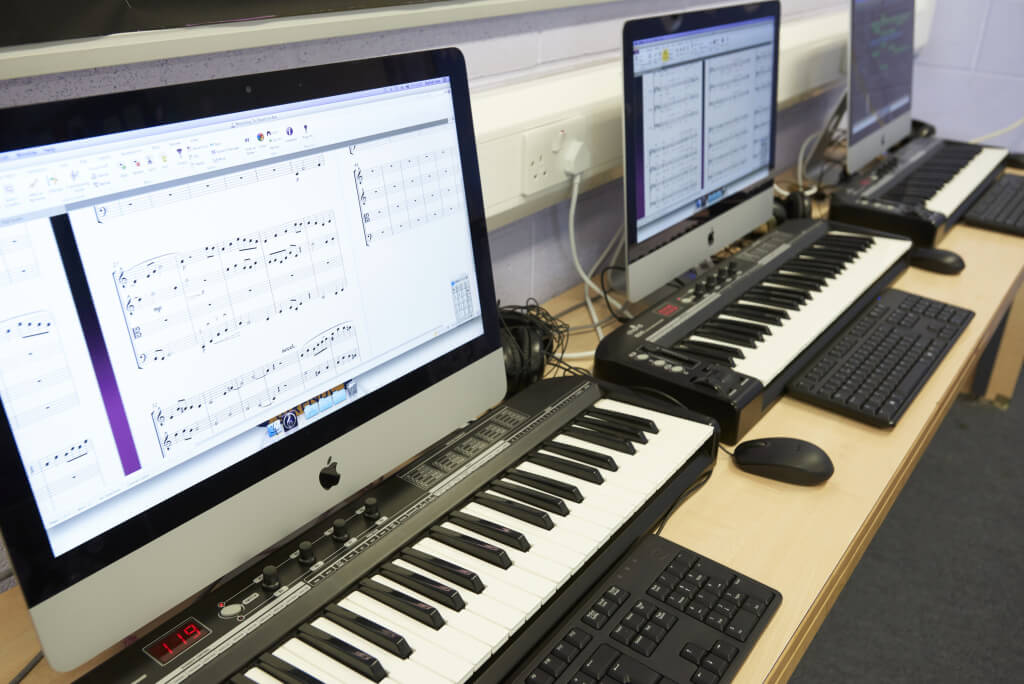 Achievements
Achievements
Rutlish students have starred on stages across the UK including:
- Awarded the Merton Music Mark 2018 in recognition of outstanding music provision
- Battle of the BAND participants every year and winners in 2018
- Performances at Gignight- Wimbledon Bookfest, Old Ruts. Putney High, Wimbledon High and St. Mary’s Church, Jack Petchey Awards and Ricards Summer Sound Festival
- Two concerts a year including; Boyscansing, Nofilter, Inunison with visiting bands and guest artists
- Visiting professionals in assemblies to support our young musicians. Including Gabe Kuanga from the US, Steve Bradford Jazz musician, Sheya Lily BBRIT School MMF percussion workshops
- Coming first in a national song-writing competition
- Christmas carolling in the community
We have reformed a parent band, No Refunds, who have performed at various events.
There are many music enrichment activities and details can be found in our enrichment section. You can also see what our students have to say about music by following this link.
| What careers will the subject support? | Which courses will the subjects support Post 16? |
|---|---|
| Teaching, the music industry, sound production, sound recording/engineering, studio work, performing, DJing, music therapy, film music writing, performing, theatre productions, private music lesson, composer. | BTEC Level 3 or A Level Music. |
| Useful GCSE Resources |
|---|
| Access to a keyboard, piano or chosen instrument |
| Individual instrumental lessons |
Physical Education
Director of PE, Sport and Physical Wellbeing: Mr Paliotta
Head of Department: Mr Joyce
Please click here to view our Curriculum Map:
To find out more about the PE Department please watch our video:
The Rutlish PE Department offers students opportunities and access to a wide range of physical activities and sport. In the curriculum students have the opportunity to participate in fitness activities, games activities, athletics and gymnastics. Extra-curricular activities are offered before school, lunchtimes and after school. Activities include football, rugby, table tennis, basketball, badminton, indoor rowing, volleyball, fitness, cricket and tennis. Students have the opportunity to use our fitness room or our indoor rowing room. Year 10 also have the opportunity to take part in the Duke of Edinburgh Bronze Award.
The department runs a series of inter house sporting events throughout the year. These activities can include football, rugby, basketball, cross country, dodge ball, indoor rowing, tennis, cricket and athletics.
We compete regularly against other schools in a variety of sports. Each year students compete in a large number of fixtures in a variety of sports. These matches normally take place after school or on a Saturday morning. In general we complete against private or grammar schools based in Surrey with the aim of challenging our students to perform to their best and improve their performance. Regular matches are arranged for rugby, football, table tennis, cricket, tennis, basketball, handball and hockey. We also attend and host festivals arranged by the Merton Schools Sports Partnership.
The school have close links with a number of local sports clubs. Rugby, football and cricket are linked with Old Rutlishians. Athletics have links with Herne Hill Harriers and Wimbledon Hercules, whilst indoor rowing is linked to London Indoor Rowing. Tennis has links with Cranleigh Tennis Club and The Wilton Tennis Club. We also have strong links with the All England Tennis Club for whom we provide ball boys during the Wimbledon Championships.
Key Stage 3
Years 7 & 8 Curriculum
Autumn to Spring
- Base Line Testing
- Health related exercise
- Gymnastics
- Badminton
- Basketball
- Table Tennis
- Rugby Union Football
- Association Football
- Cross Country
- Hockey
Summer
- Cricket
- Softball
- Tennis
- Athletics Track and Field
- Rounders
Year 9 Curriculum
Autumn to Spring
- Health related exercise
- Indoor Rowing
- Trampolining
- Basketball
- Badminton
- Table Tennis
- Rugby Union Football
- Association Football
- Hockey
Summer
- Cricket
- Softball
- Athletics Track and Field
- Tennis
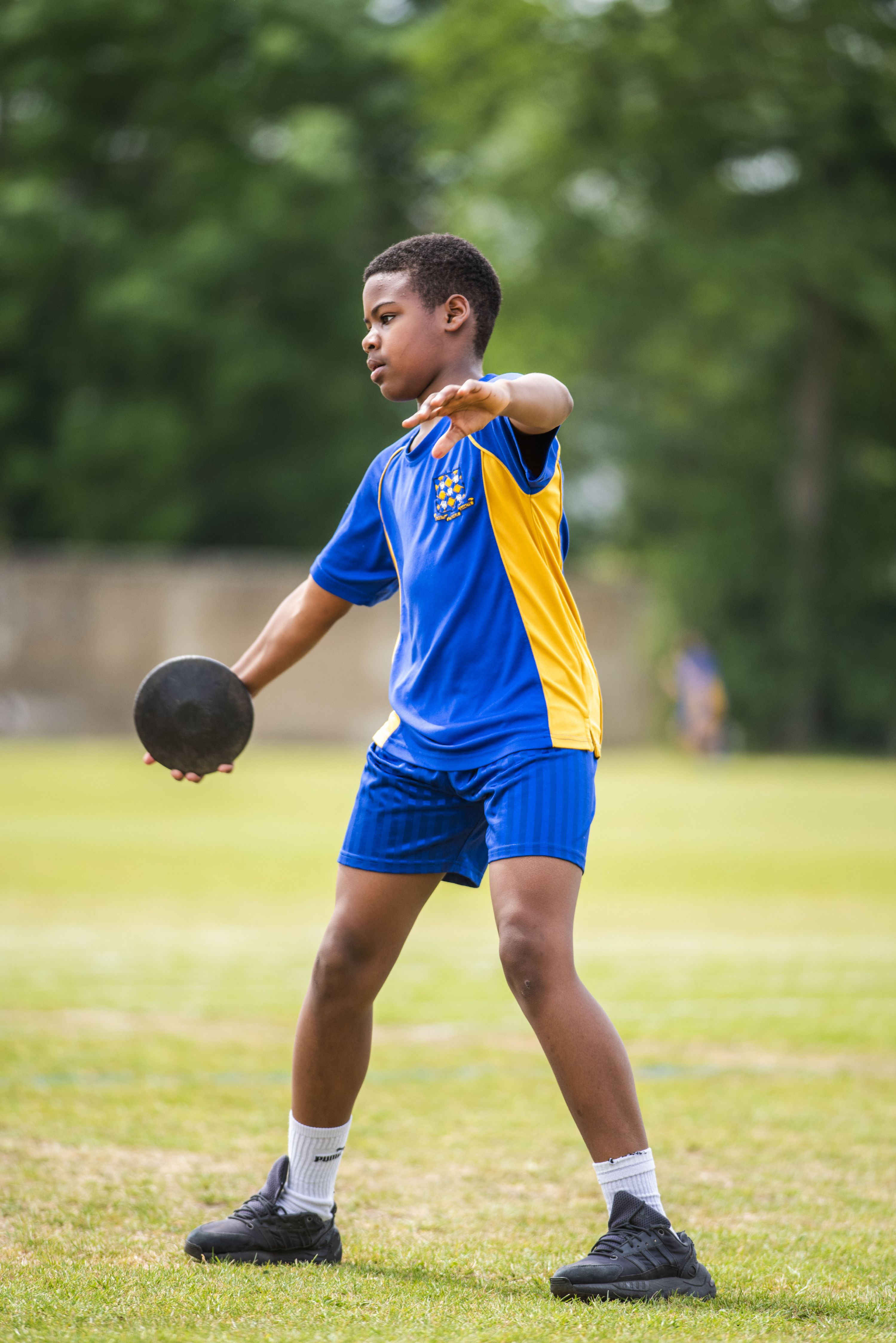
Key Stage 4
All students continue to participate in core physical education during Years 10 and 11, where they can specialise in two or three activities. This allows us, therefore, to offer a progressive physical education from the time the students join us at Rutlish to the time they leave.
In addition, we offer courses that are externally verified by EDEXCEL. There are two options open to students at exam level:
- GCSE Physical Education
- BTEC First in Sport Level 2
Details of the content and requirements of these options are published in the Options Booklets for in Year 9.
| What careers will the subject support? | Which courses will the subject support Post 16? |
|---|---|
| Sports related careers linked to coaching, teaching and physiotherapy. | BTEC Level 3 Sport or A Level PE |
| Useful GCSE & BTEC Resources |
|---|
| Edexcel PE GCSE Revision guides and course books including GCSE P.E. Essentials, Neate |
| BTEC Level 2 Firsts in Sport 2nd Edition. Barsby et al, Oxford University Press & Edexcel Sport, Level 2 Btec First-Adams, Beashel |
| P.E. for You, Honeybourne, Hill & Wyse |
| PE to 16, Fountain & Gee – OLP |
| PE for Edexcel, Tony Scott - Heinemann |
| Topend Sports |
| Brian Mac Sports Coach |
| BBC Bitesize |
PSHE & RSE
Head of Department: Miss Read
Please click here to view our Curriculum Map:
Personal, Social, Health and Economic Education and Relationships and Sex Education
PSHE & RSE contributes to providing a broad and balanced curriculum which meets students’ needs and prepares them for the challenges, opportunities and responsibilities of adult life. Through PSHE & RSE students build emotional resilience, life and social skills, and will develop the qualities and attributes they need to thrive as individuals, family members and members of society. PSHE & RSE helps students to connect and apply the knowledge and understanding they learn in all subjects to practical, real-life situations while helping them to feel safe and secure enough to fulfil their potential.
Schools have statutory responsibilities in relation to promoting student wellbeing, safeguarding and community cohesion, as well as promoting the spiritual, moral, social and cultural development of pupils at the school and ensuring that students engage with fundamental British values. PSHE & RSE plays an important part in fulfilling all of these responsibilities.
KS3, KS4 and KS5 are taught one hour of PSHE & RSE each fortnight. All PSHE & RSE lessons are based around the following key concepts: identity; relationships; lifestyle; risk and safety; diversity and equality; rights, responsibilities and consent; change and resilience; power; and careers.
KS3
YEAR 7
In Year 7 students learn about themselves and others in their class. They learn how to deal with change, build resilience in their new school and how to work with other people effectively. Students also learn about puberty, building on what they may have been taught during KS2 to gain an understanding of how to manage changes in their bodies and their lives. Students are asked to consider different types of relationship and how relationships might change through divorce or bereavement. Finally, students learn about identity and belonging in relation to active citizenship, local communities and multicultural society.
YEAR 8
In Year 8 students build upon previous learning about themselves and others and consider what might affect someone’s self-esteem and how the media might influence young people. Following this, students learn about eating disorders, personal hygiene, budgeting, cyber-bullying and the risks of alcohol and smoking. Students are introduced to sex education in Year 8, considering intimacy and readiness for sex, as well as learning about different forms of contraception. Students also learn about rights and responsibilities and how to challenge prejudice and discrimination.
YEAR 9
In Year 9 students are introduced to more controversial and difficult topics. They learn about sexual health, gender identity and mental and emotional health. They also learn about the social and personal risks of taking drugs and the dangers of gangs, knife crime and gambling. They are taught about consent and consider what might be deemed an unhealthy relationship. Students are taught about how the media portrays sex and impacts upon sexuality. In Year 9 they consider what career might suit them and be given support and guidance with their GCSE options. Finally, Year 9 students learn about human rights, intolerance and the risks of extremism for young people.
KS4 and KS5
In KS4 and KS5 PSHE & RSE covers all three core themes of the Programme of Study, Health and Wellbeing; Relationships; and Living in the Wider World.
We cover core knowledge relating to issues such as online and offline safety, relationships, health and careers, taught in a way which is appropriate to the age and maturity of students. Students learn about the attributes of healthy and unhealthy relationships and the readiness for sex, as well as learning about different forms of contraception
The subject is tied together by the development of the key skills and attributes which students need to thrive both in their childhood and throughout their adult lives. These key skills and attributes - such as self-management, empathy, critical thinking, communication, resilience, teamwork and negotiation – are crucial to student’s life chances.
To view our PSHEE and RSE Policy please visit our policies page: Policies
Psychology
Lead Teacher: Ms Bremner
Please click here to view our Curriculum Map:
applied psychology btec curriculum map
Psychology and Applied Psychology are taught in RR6 and all subject information can be found on our RR6 pages.
Religious Education
Head of Department: Miss Mates
Please click here to view our Curriculum Map:
Our Religious Education Department at Rutlish is a vibrant, energetic and happy area of the school in which all students and staff actively participate. We have six specialist members of staff who are passionate about our subject. We work collegially and supportively and this is reflected in all aspect of what we do. We collectively take responsibility for the creation and sharing of resources to ensure that all students of RE receive the same high quality teaching across classes.
Our students are encouraged and taught how to search, question and evaluate all areas of religion and spirituality. We aim to motivate good learning and achievement through a wide range of teaching methods. We ensure that the importance of literacy is a fundamental part of teaching and our students know of how to write academically sound material. We are a well-resourced department with extensive structured SOW’s. Interactive Whiteboards, textbooks, artefacts and we are always improving our resources to broaden and enhance student experiences. We are proud of our learning environment that reflects the spiritual, religious and cultural world of our community and teaching content.
The Religious Education Department is a crucial part of the school ethos and we are involved in developing and supporting whole school events. This is an exciting and continually growing area of Rutlish and both students and staff show their enjoyment of RE through exuberant teaching and learning. Staff are involved in regular CPD to support their personal review and develop identified areas of specialism. The department also works with the IOE, St Marys, Kingston, Roehampton and Middlesex University and Teach Wimbledon to provide opportunities for beginning teachers.
Our main hope is that our students continually achieve through a passion for RE, developed by a happy, fun-loving staff who have a compassion for each individual they work with. We have an open teaching style, working together and offering support within the classroom to ever improve our quality delivery for the boys.
As a core subject, the department has consistently delivered on results, we are in the top 3% of schools nationally in RE. Our students enjoy taking part in a subject in which they are confident they will be successful.
Our school curriculum for Religious Education meets the requirements of the 1988 Education Reform Act (ERA). The ERA stipulates that religious education is compulsory for all children. The ERA allows parents and carers to withdraw their child from religious education classes if they so wish, although only after they have given written notice to the school governors. The ERA also allows teachers to refuse to teach religious education, but only after they have given due notice of their intention to the school governors. The religious education curriculum forms an important part of our school’s spiritual, moral, social and cultural teaching. It also promotes education for citizenship.
Our school RE curriculum is based on the Merton SACRE, the National Curriculum, including GCSE Religious Studies and GCE A-Level Philosophy and it meets all the requirements set out in that document. The ERA states that the RE syllabus should reflect the fact that religious traditions in Great Britain are, in the main, Christian, and that it should, at the same time, take account of the teachings and practices of other major religions.
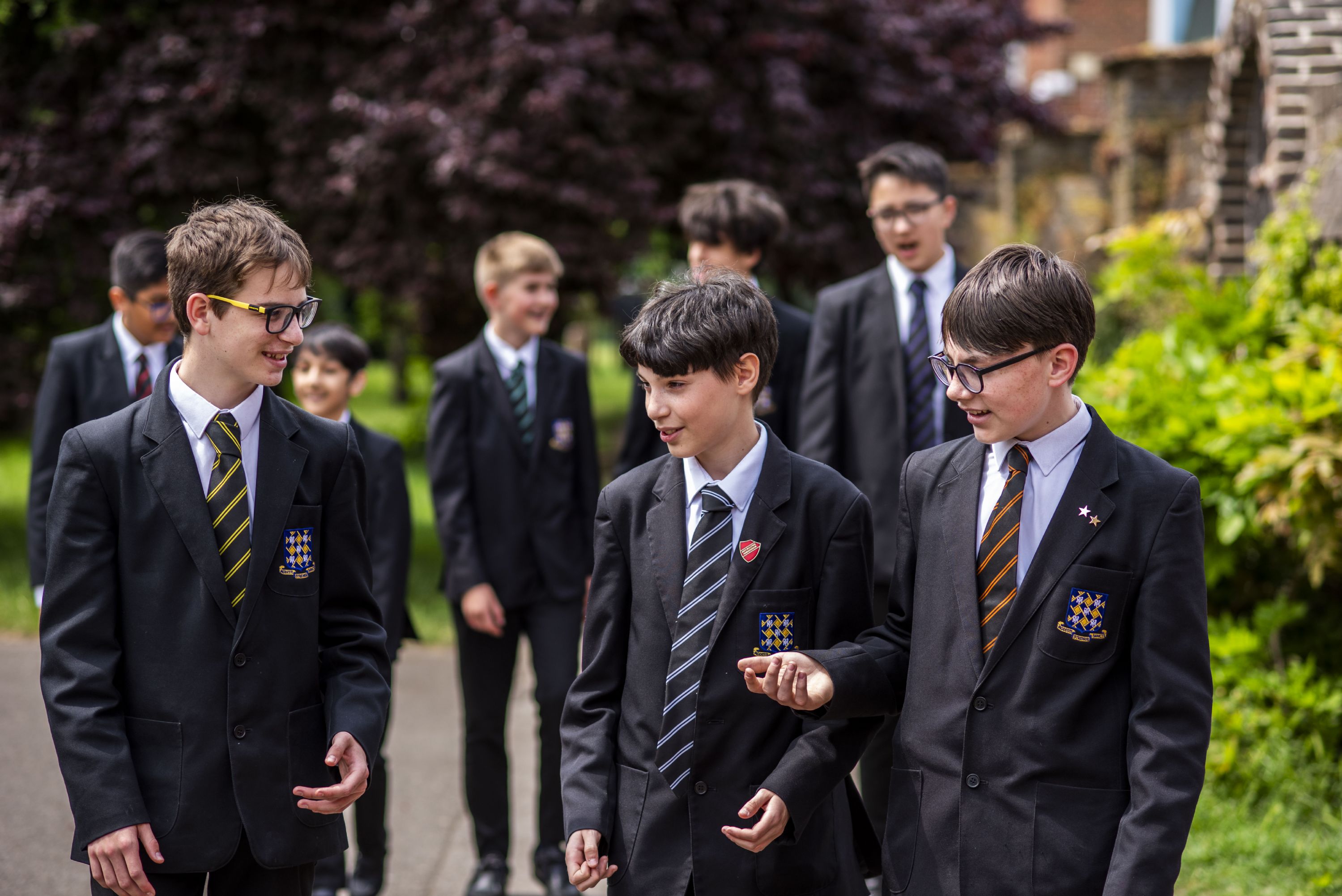
KS3
At KS3 all students follow the Merton Agreed Syllabus in RE. The department teaches all the major world religions throughout KS3, including Judaism, Christianity, Islam, Hinduism, Buddhism and Sikhism. In addition, students learn about other world faiths and traditions, philosophical ideas and the whole range of political, social and personal ideas and questions that these subjects entail.
KS4
At KS4 all students study the Edexcel GSCE RE Specification B.
In Year 10, students focus on Christian beliefs and practices, Christian teachings on a range of issues within the areas of marriage and family and matters of life and death.
In Year 11 students focus on Islamic beliefs and practices, Islamic teachings on a range of issues within the areas of crime and punishment and peace and conflict. Students will sit two GCSE exams at the end of Year 11.
As a core subject, the department has consistently delivered significantly above the national average in RE and consistently achieve 20% above national average for boys studying RE, we know that our students enjoy taking part in a subject in which they will be successful. In 2017/18 students achieved 81% 4+ and 45% 7+ in Y11 at GCSE.
KS5
Philosophy is taught in RR6 and more can be found on our RR6 pages.
| What careers will the subject support? | Which courses will the subject support Post 16? |
|---|---|
| Careers in politics, civil service industries, education, HR, international relations, journalism, law, police, occupational therapist, public relations, social work | Studying RE at GCSE equips students to pursue a variety of literacy based Post 16 subjects. These include: Sociology, Philosophy, History, Politics, Geography, English Literature, BTEC Law |
| Useful GCSE Resources |
|---|
| Beliefs in Action. Specification B. Victor Watton and Robert Stone.(Hodder education) ISBN 978-1-471-86659-3 |
| Religious Studies: Paper 1 Religions and Ethics: Christianity. Lynne Gibson (Pearson) ISBN 978-1-292-13932-6 |
| Religions and Ethics through Christianity Gordon Reid and Sarah K Tyler ISBN 978-0-19-837040-6 |
Science
Head of Biology: Mrs Nash
Head of Chemistry: Ms Beck
Head of Physics: Ms Ryan
Please click here to view our Curriculum Maps:
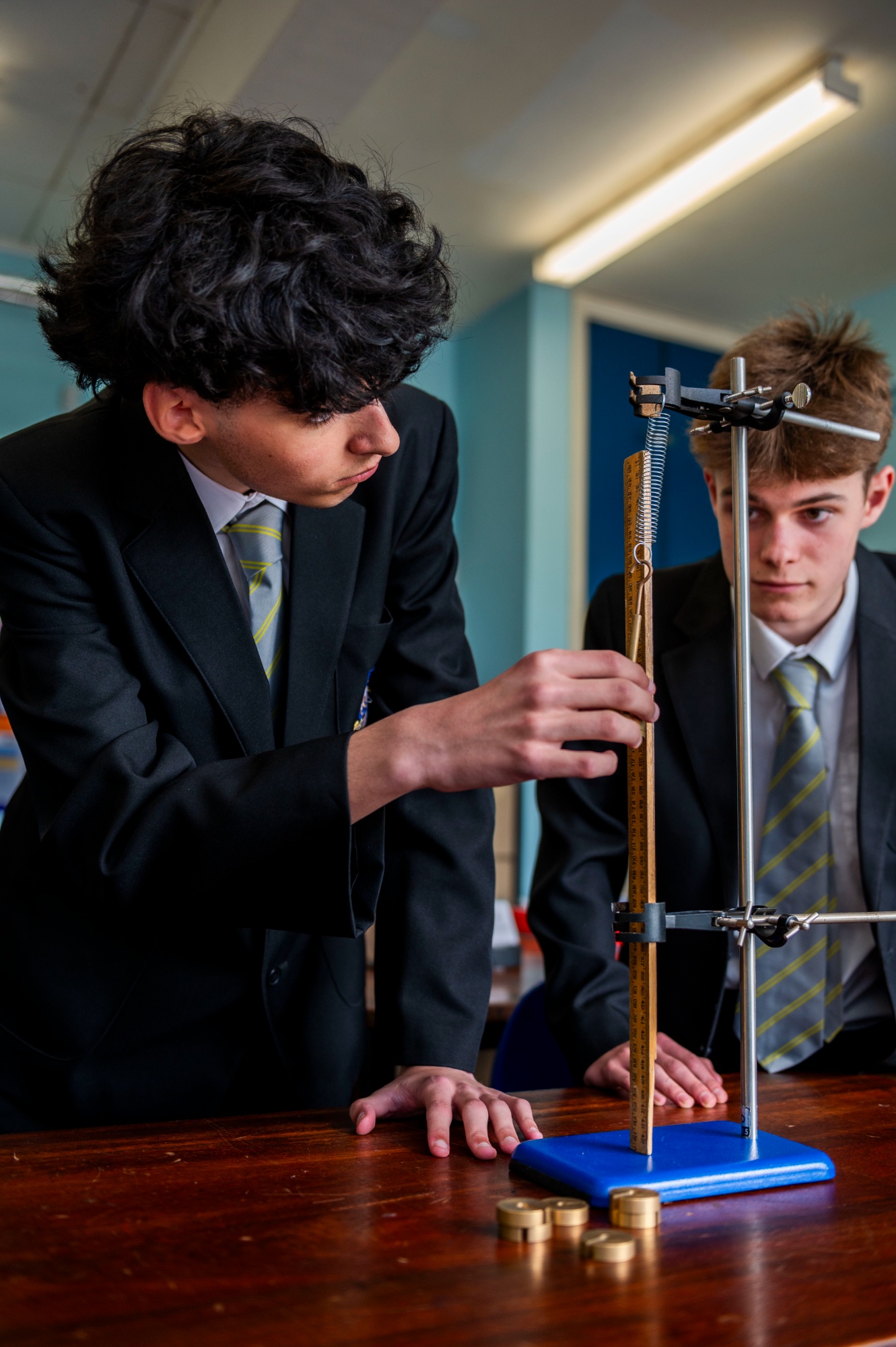 The Department is fully staffed with a Head of Biology, Head of Chemistry and Head of Physics, as well as 2ic’s for each subject. Other responsibilities and representation on key whole school working groups are shared amongst the team. We have four experienced technicians, one full-time and three part-time, all of whom are extremely helpful. We have a great mix of twelve teaching staff within the Department covering all science disciplines which shares experience and expertise with the enthusiasm and knowledge of current educational views of the newer members of staff.
The Department is fully staffed with a Head of Biology, Head of Chemistry and Head of Physics, as well as 2ic’s for each subject. Other responsibilities and representation on key whole school working groups are shared amongst the team. We have four experienced technicians, one full-time and three part-time, all of whom are extremely helpful. We have a great mix of twelve teaching staff within the Department covering all science disciplines which shares experience and expertise with the enthusiasm and knowledge of current educational views of the newer members of staff.
The Science Department is mostly housed in the Main Building on two floors where there are nine laboratories and two preparation rooms. All of the laboratories have interactive whiteboards and the Department is able to take classes to work in the Learning Resources Centre and bookable ICT rooms.
Key Stage 3
At Key Stage 3 (Years 7 &8) we teach the AQA Big Ideas specification. This breaks down science into 10 big ideas that are taught in Year 7 and then revisited in Year 8.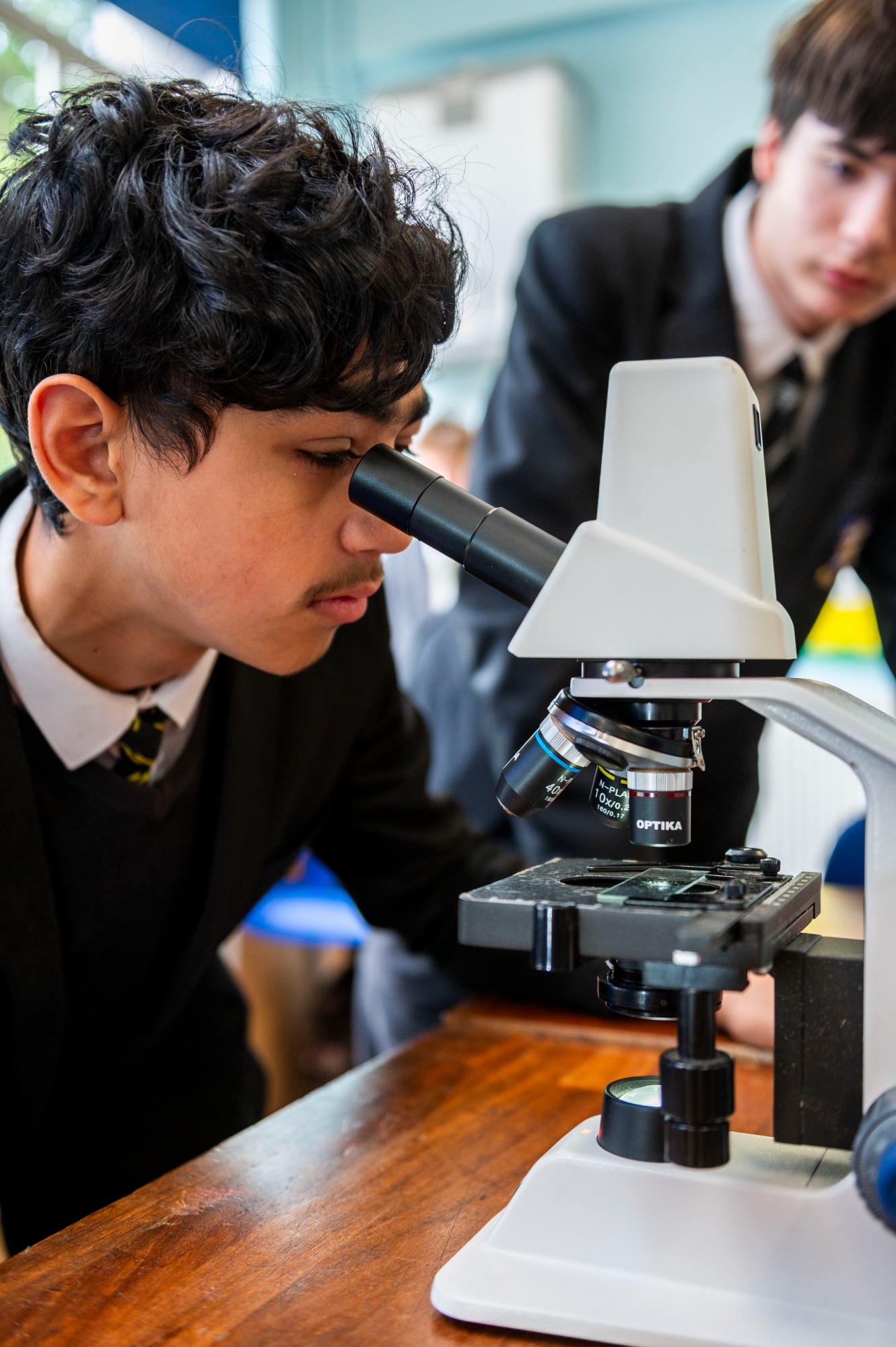
In Biology the Big Ideas are: Organisms, Ecosystems, and Genes.
In Chemistry the Big Ideas are: Matter, Reactions, and Earth.
In Physics the Big Ideas are Forces, Electromagnetism, Energy and Waves.
Students are assessed at the beginning of Year 7 in order to determine their starting ability. This test will be used to set students, however sets are regularly reviewed throughout the year. Students are also assessed at the end of each topic, using the GCSE 1-9 scale. There is an end of year exam which questions students’ understanding of topics from throughout the course.
Key Stage 4
At Key Stage 4 (Years 9-11) students study either the AQA Trilogy course (Double Science GCSE) or AQA Biology, Chemistry and Physics. The decision between the Double and separate GCSE courses is made in the spring of Year 10, when students complete a mock assessment. Students should achieve a grade 6 or above in order to be assured a place on the triple science course.
Students will study the following topics:-
Biology: Cell Biology; Organisation; Infection and Response; Bioenergetics; Homeostasis and response; Inheritance, variation and evolution; Ecology.
Chemistry: Atomic structure and the periodic table; Bonding, structure and the properties of matter; Quantitative chemistry; Chemical changes; Energy changes; The rate and extent of chemical change; Organic chemistry; Chemical Analysis; Chemistry of the atmosphere; Using resources.
Physics: Energy; Electricity; Particle model of Matter; Atomic structure; Forces; Waves; Magnetism and electromagnetism; Space physics.
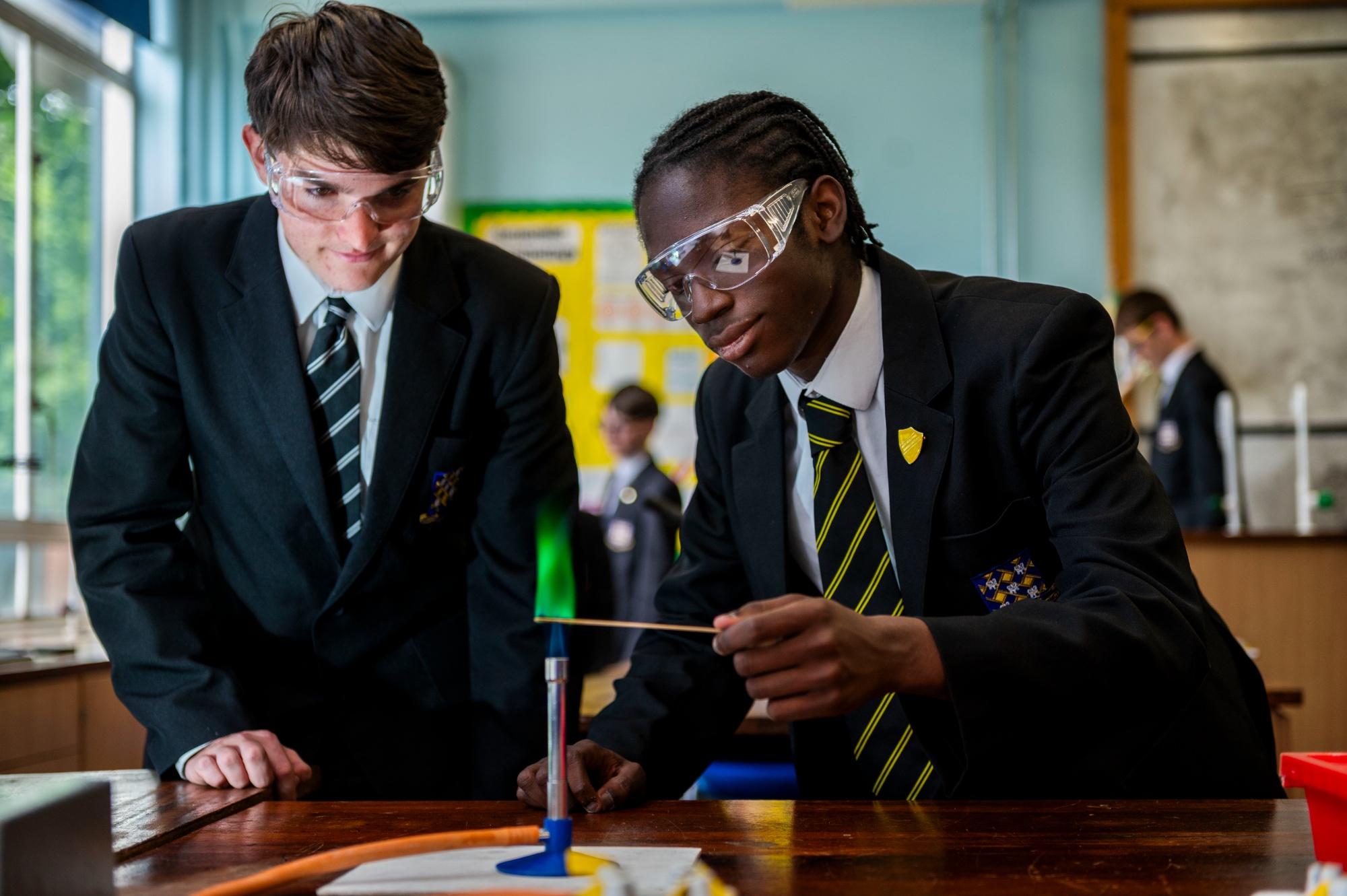
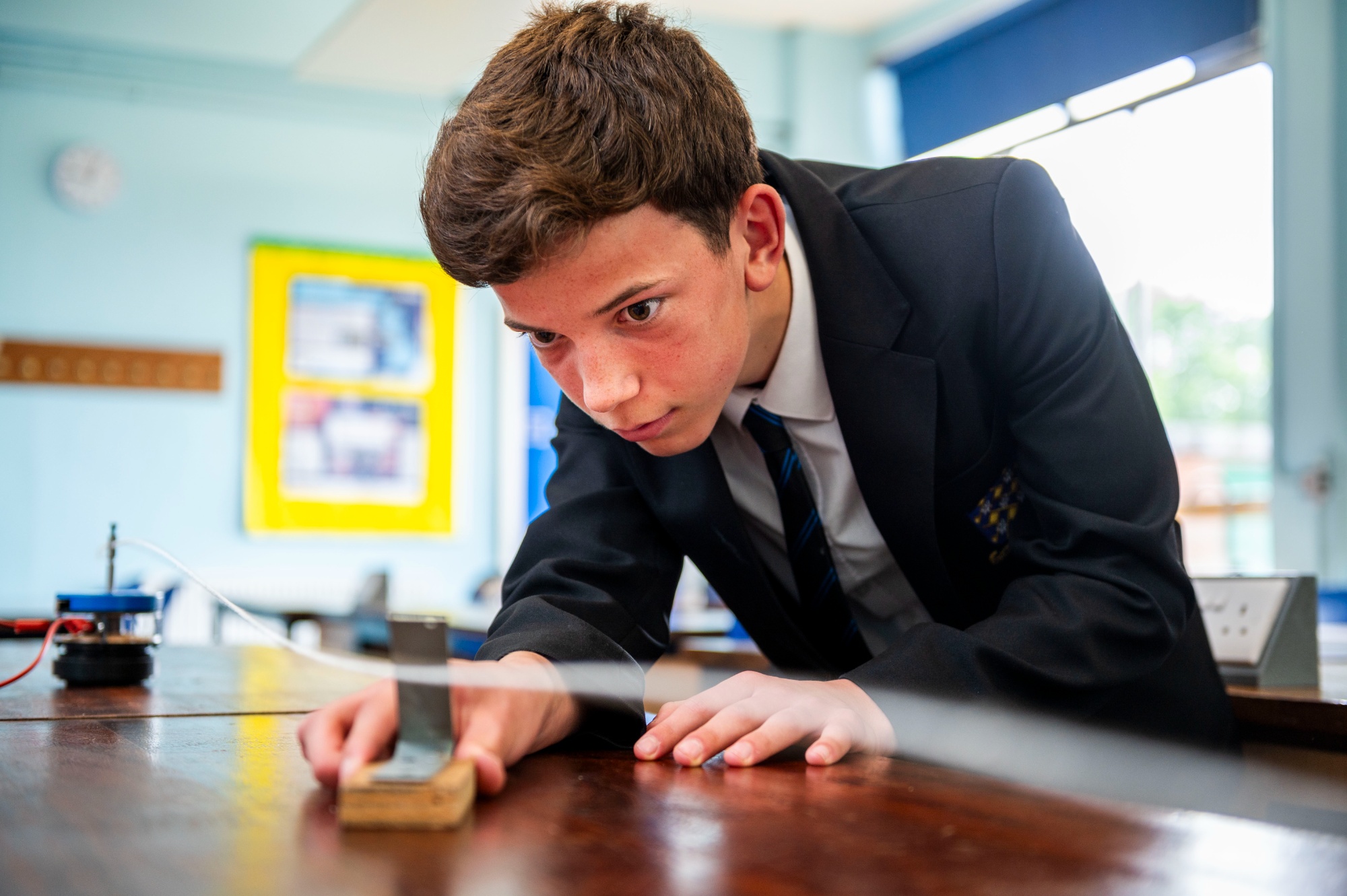
Other Information
Enrichment and enhancement activities which have been offered to students include a Science Club in Years 7 and 8 and revision classes for Years 9, 10 and 11. Students have taken trips in recent years to the Science Museum, The Royal Observatory Greenwich, Fieldwork Centres and Universities.
The main aim in the department is to make this an area of the school that students enjoy visiting, where they feel that the lessons are well planned and imaginatively taught by teachers who are in command of their subject with the ability to inspire. Our excellent results show we are achieving this.
| What careers will the subject support? | Which courses will the subject support Post 16? |
|---|---|
| DOUBLE SCIENCE: The scientific skills from this course can be applied to a very wide range of careers including engineering, scientific research, animal care, finance, health and beauty. | A-levels in science subjects such as Biology, Chemistry, Physics, Environmental Science. BTEC Applied Science: the course will also provide skills and knowledge useful in vocational studies such as Engineering, Healthcare, Agriculture, Animal Management, Hair and Beauty, Computer Science |
| TRIPLE SCIENCE: Separate science GCSEs are favoured for students considering a career in medicine or for those wanting to pursue scientific research. | A-levels in science subjects such as Biology, Chemistry, Physics, Environmental Science. BTEC Applied Science: The course will also provide skills and knowledge useful in vocational studies such as Engineering, Healthcare, Agriculture, Animal Management, Computer Science |
| Useful GCSE Resources |
|---|
| Double Science: http://www.aqa.org.uk/subjects/science/gcse/comb ined-science-trilogy-8464 |
| Biology: http://www.aqa.org.uk/subjects/science/gcse/biology-8461 |
| Chemistry: http://www.aqa.org.uk/subjects/science/gcse/chemistry-8462 |
| Physics: http://www.aqa.org.uk/subjects/science/gcse/physics-8463 |
| GCSE Science - BBC Bitesize |
| http://www.docbrown.info/ |
| CGP Science GCSE revision guide |
Sociology
Head of Department: Miss Mates
Lead Teacher: Miss Khalique
Please click here to view our Curriculum Map:
Sociology is taught in RR6 and all subject information can be found on our RR6 pages.
Literacy
Literacy at Rutlish
Literacy embodies reading, writing, speaking and listening. At Rutlish School, we recognise that literacy is at the heart of successful learning and therefore believe that the development of vital literacy skills is an entitlement for all students. As a result, a focus on literacy is embedded within teachers’ planning and practice across the curriculum. In this sense, every teacher is a teacher of literacy.
Having proficient literacy skills enables our students to realise their full potential by developing their cognitive ability and critical thinking skills in order to leave school fully prepared for the following stages of their lives. Furthermore, we believe that improving literacy standards is central to raising student self-esteem, confidence and achievement.
Rutlish School acknowledges the immense impact of literacy in the lives and future of our students:
- 1-in-6 people in the UK struggle with literacy. This means their literacy is below the level expected from an eleven year old. (National Literacy Trust)
- “Students who begin with high verbal aptitudes find themselves in verbally enriched social environments and have a double advantage.” (Daniel Rigney)
- “Spoken language forms a constraint, a ceiling not only on the ability to comprehend but also on the ability to write, beyond which, literacy cannot progress.” (Myhill and Fisher)
- “Research shows that people with good literacy skills are more likely to have higher self-esteem, better health, better jobs and higher wages than those with poor literacy skills. They are more able to take advantage of the opportunities that life may offer them.” (National Literacy Trust)
In addition to a focus on literacy within the curriculum, there are additional opportunities for students to strengthen their literacy skills during pastoral and extra-curricular activities:
Learning Resource Centre:
Our library is well-stocked with a variety of fiction and nonfiction texts, thanks to increased funding and generous parental donations. Our Literacy Coordinator and Librarian research and select books to appeal to students with a range of reading tastes.
The LRC is open to students before and after school, with guidance available from the Librarian and student Library monitors.
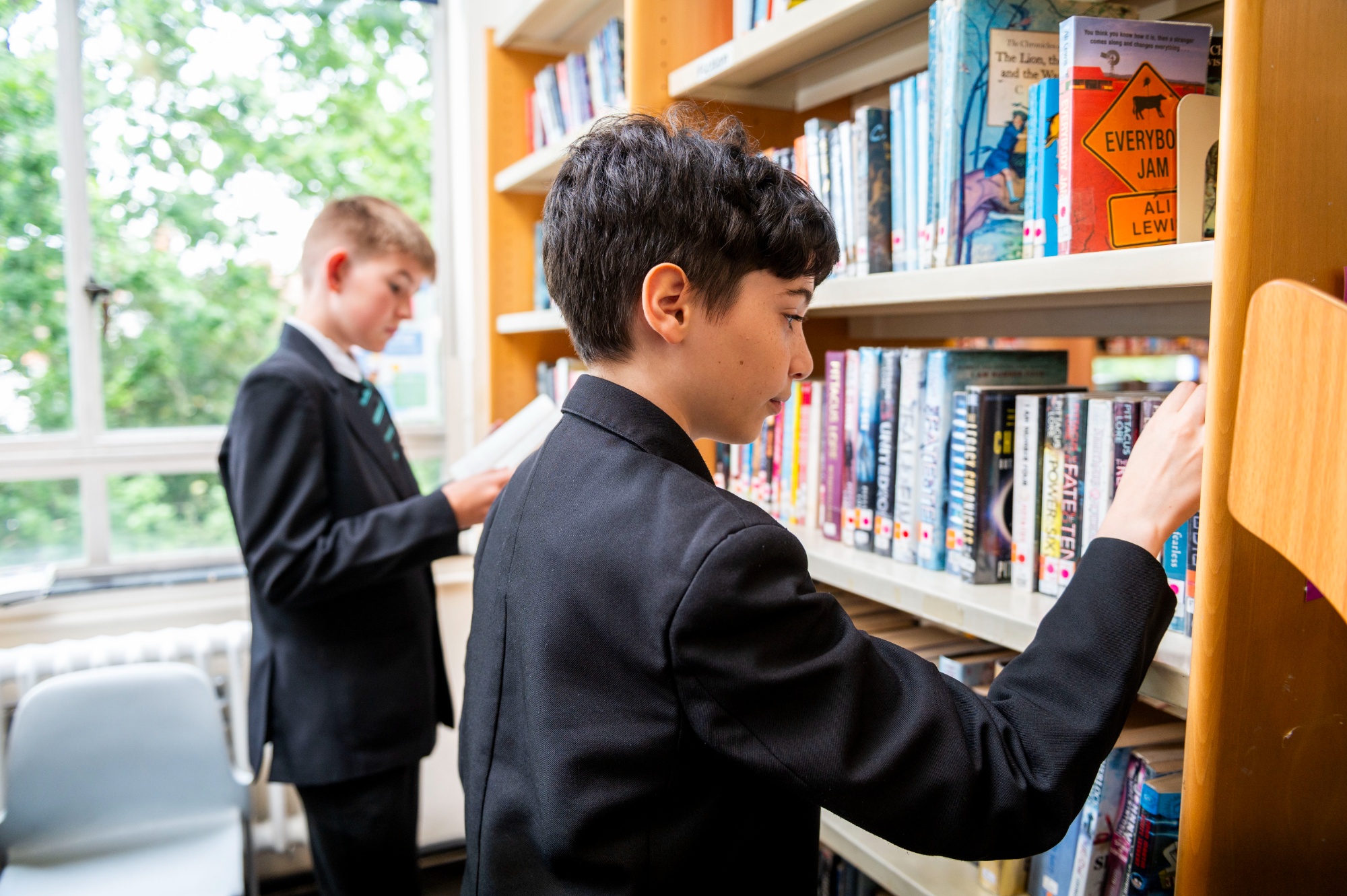
Tutor time literacy activities:
- Spelling tests of subject specific vocabulary targeted at each year group
- Class reading and group discussion of popular short stories (ranging from Roald Dahl’s ‘The Landlady’ to Sherlock Holmes’ ‘The Speckled Band’) for KS3 students
- Challenging Literacy resources including Spelling, Punctuation and Grammar (SPAG) support for KS4 students, along with activities for expanding vocabulary ahead of their GCSEs.
- Drop Everything And Read (D.E.A.R) weeks at the end of each term. Each morning, students (and staff) will read independently during registration. (Department of Education 2012: “20 minutes reading a day can have an impact of just over a year’s schooling in terms of performance”)
Extra-curricular literacy initiatives and links:
- KS3 Creative Writing Club every Tuesday after school.
- Jack Petchey ‘Speak Out Challenge’ for KS4
- The ‘16 Before 16 Challenge’ which is to read 16 of the ‘Classics’ before you are 16 years old (extended to 18 before 18 for those students carrying on the sixth form)
- All Year 7s automatically enrolled as members of all Merton’s Libraries.
- Be the Librarian: use the targeted bookmarks available in the library to explore and discover different novels by your favourite or recommended authors
- Annual celebration of World Book Day through writing competitions and prizes for other activities, enhanced library, distribution of book tokens
- Promotion of external writing competitions including Wimbledon BookFest’s Young Writers Competition.
- Celebration of National Poetry Day with the writing of a poem contributed to by all tutor groups across the school.
- Termly Celebration of Achievement assemblies, with awards for outstanding student efforts and interest in literacy.
- The school is a member of the National Literacy Trust, which provides a range of cross-curricular literacy resources and facilitates data collection to track and resolve literacy issues across the school.
- The Literacy Room on Fronter contains resources and links for all year groups, with a focus on enrichment of vocabulary and self-expression.
The National Agenda for Literacy
“Literacy is an essential life skill. To make sense of the world around them, young people need an understanding of written and spoken language, the ability to interpret what has been written or said, and to draw inferences from the evidence that surrounds them. It is also about being able to communicate – accurately, fluently and persuasively.”
“Through all of this change, the development of literacy skills remains central to a young person’s life chances. Without them, full participation in the workplace and society as an adult will be a constant struggle. Every school needs a rigorous whole-school literacy policy which is implemented systematically across the curriculum and all teachers should view themselves as teachers of literacy, regardless of their subject specialism. Some schools have achieved this and as a result young people are able to not only access the curriculum, but have the tools to extend their thinking and knowledge with outstanding results.”
Curriculum Intent Statement- English
What do we want our students to know before they leave/finish their studies in English?
- We aim for our students to achieve academically to the best of their ability in English. In order to do this, we stretch, challenge and support our students. We help them to be open minded, balanced and reflective members of our society.
- We teach and model high moral standards, social and self-awareness and acceptance of social diversity.
- We aim for our students to develop an enthusiasm for the subject that would help them enjoy the creative experiences in Language and Literature.
- We help our students to develop their confidence in order to become articulate and perceptive individuals in society.
How do we plan learning over time to develop pupils’ understanding?
- We teach GCSE skills through KS3 to KS4.
- Grading in KS3 is modelled on GCSE levels (1-9). This will prepare them for the criteria later on in their GCSE mark schemes.
What relations do we need with other subject areas?
- There are close literacy links throughout topics. The school marking policy requires all subjects to have a literacy comment for the students.
- We teach social, religious and historical context for all the topics taught through KS3 to KS5- this links us to History, Sociology, RE and Politics.
- In Media, students use analytical skills taught in English.
- Drama requires them to be analytical about characters and read and comprehend plays. Plays are taught in English in all year groups.
- RE also hones skills of evaluation and developing argument, which is one of the main skills we teach in English.
- We help develop students’ curiosity and knowledge through connecting/making links between all aspects of culture.
How will we evaluate the confidence of English Curriculum?
- Students are regularly assessed through Midway Assessments and End of Unit Assessment which are thoroughly marked and students given targets based on their performance.
- Each assessment has a feedback lesson in which they read the teachers comments and use their targets to improve their work.
- Students’ class and homework gives the teacher an understanding of the level of their comprehension and attainment. Their contribution and participation in class discussions further informs the teacher.
How do we evaluate the quality of English education?
Our department follows a thorough assessment calendar for all year groups. We ensure consistency in the department through our Learning Walks and Book Looks and sharing best practice. This ethos encourages everyone to share resources and reflect on our own teaching.
What training do staff receive?
- We follow the whole school student training program for PGCE and NQT teachers which requires our experienced teachers to mentor them.
- We participate in AQA online GCSE exam feedback training.
- Webinars
- We send some of our mock Year 11 exam papers to be marked by experienced external AQA markers who provide us with feedback which informs our teaching and marking. We also carry out moderation within the Department for these papers which we use to compare our marking with the external marker.
- CPD carried out during department meetings.
- Assessment marking regularly moderated.
Numeracy
Numeracy at Rutlish
Mathematics is used every day in all areas of our lives. Numeracy is having the confidence and skills to use mathematics to solve problems. The competence with numbers that students develop at Rutlish will have a lasting impact on their lives financially, socially and professionally.
The aims of our numeracy policy are for our students to learn to:
- solve complex problems
- analyse different options numerically
- understand how data is gathered and presented
- handle finances, timetables and budgets.
We recognise the importance of a comprehensive and effective maths education for all students, at all proficiency levels. Like literacy, mathematical fluency is essential to secure the career or further education path of their choice when they leave school.

In order to achieve these aims, the most important objective is for our students to have a positive attitude towards mathematics. In mathematics lessons, we aim for all students to be actively engaged in “doing mathematics” themselves rather than just watching others do it. To increase engagement, students are taught to recognise the importance of mathematics across the curriculum and in everyday life. To achieve this, students investigate meaningful real-world problems whenever possible. We also help the students to make interdisciplinary connections as students learn best when they connect mathematics to other subjects, including science, economics, design technology and art. Students are also given the opportunity to discuss mathematics with one another, refining and critiquing each other’s ideas and understandings. Communication can occur through paired work, small group work, or class presentations.
Our mathematics curriculum has been designed with the flexibility to allow teachers to use the content in such a way that best supports their teaching style, connects content with real-world problem solving and brings a creative element to the maths classroom. The mathematics department is aware of the mathematical techniques required in other subjects and provides assistance and advice to other departments, so that a correct and consistent approach is used in all subjects. The mathematics department liaises with other teachers when needed to ensure that students have appropriate numeracy skills.
The strategies being used to develop numeracy across the school outside mathematics lessons are as follows:
- increase engagement with numeracy across the school through a varied and fun tutor time program.
- help students recognise the numeracy skills required for different subjects through delivery of subject related tasks in the tutor time programme.
- award Numeracy Points to students completing numeracy related tasks. Prizes are awarded at the end of each term for tutor groups and students with the most Numeracy Points.
- participate in the national UKMT maths challenge events which aim to promote a love of problem solving. These events are designed to make students think and are accessible to all but challenge the more experienced students.
- post regular puzzles and competitions on Fronter throughout the year for students to participate in at home.
How can I help my child with Numeracy?
Learning does not just take place in the classroom, it can happen anywhere. A young person’s everyday routine offers many opportunities and experiences to practise and apply their numeracy skills in real and meaningful ways. Below are some simple ideas to build numeracy skills into everyday activities:
- Look at graphs and charts online, on TV or in a newspaper and discuss the results.
- Allow your child to plan a route and calculate journey times.
- Follow a recipe independently.
- Research best deals together when planning a large purchase such as mobile phone tariffs/contracts or entertainment packages.
- Ask your child to calculate total costs for items being purchased online.
- Plan meals for the week using a set budget using online grocery stores to find prices.

